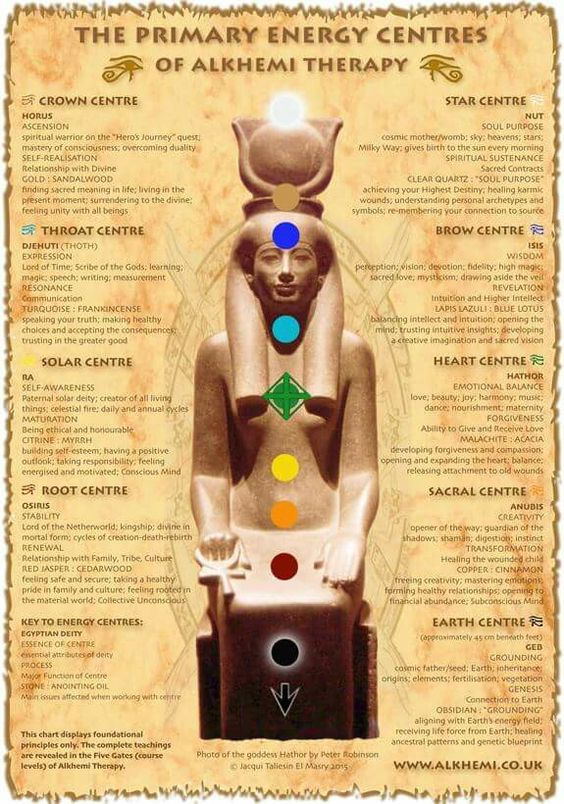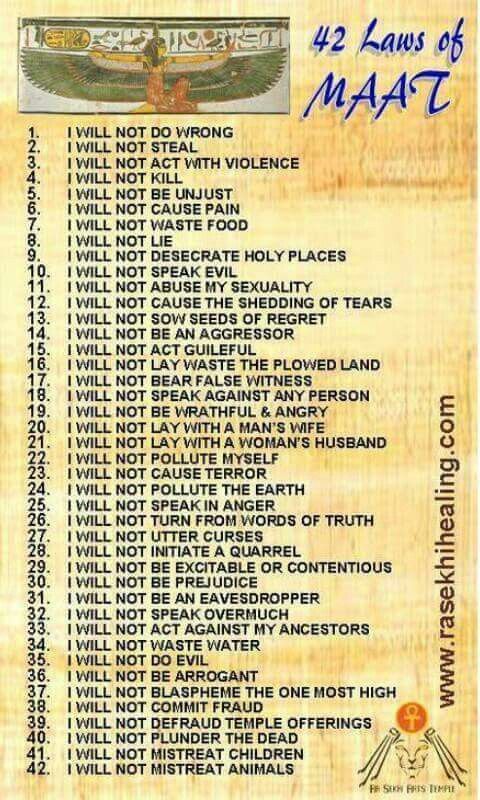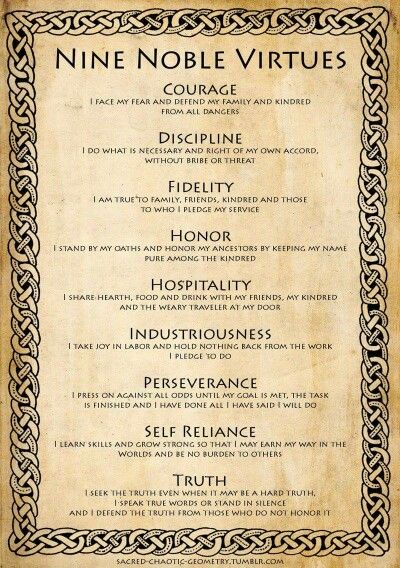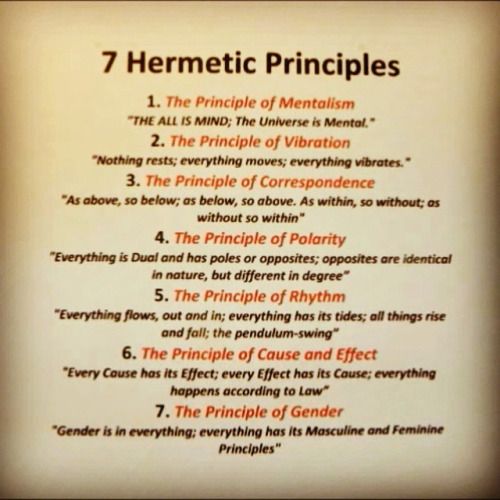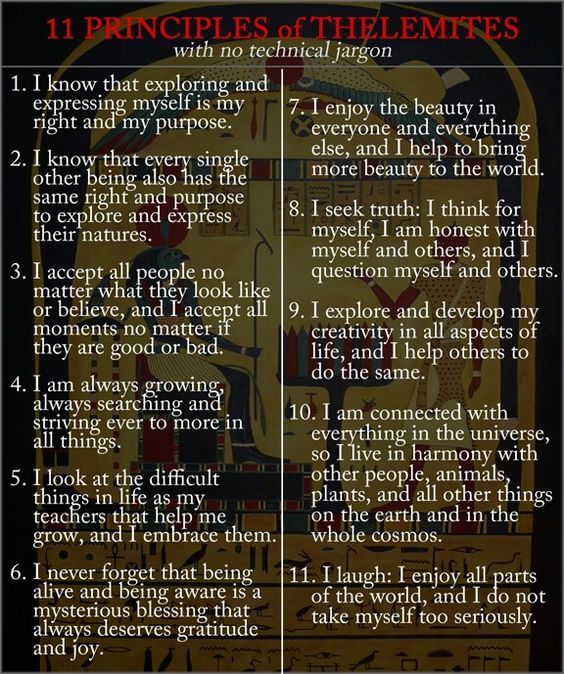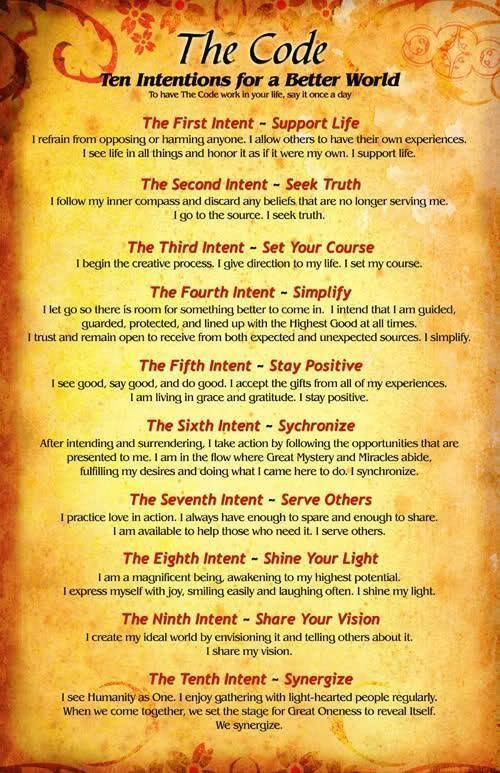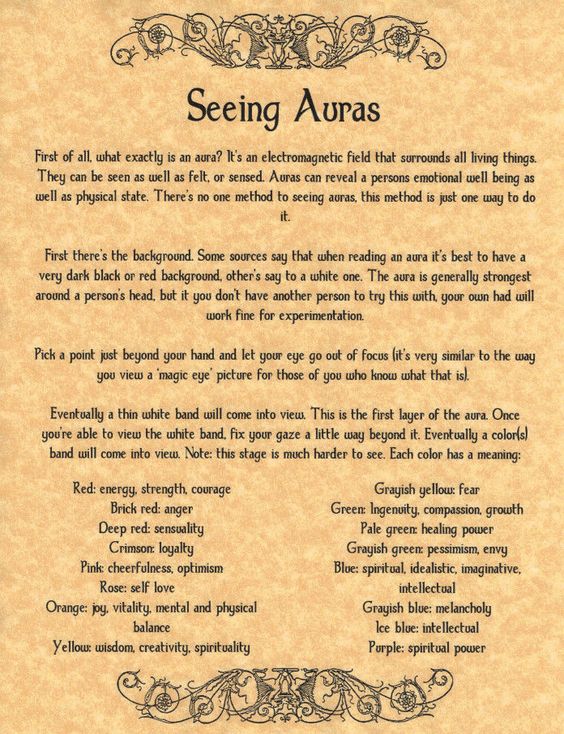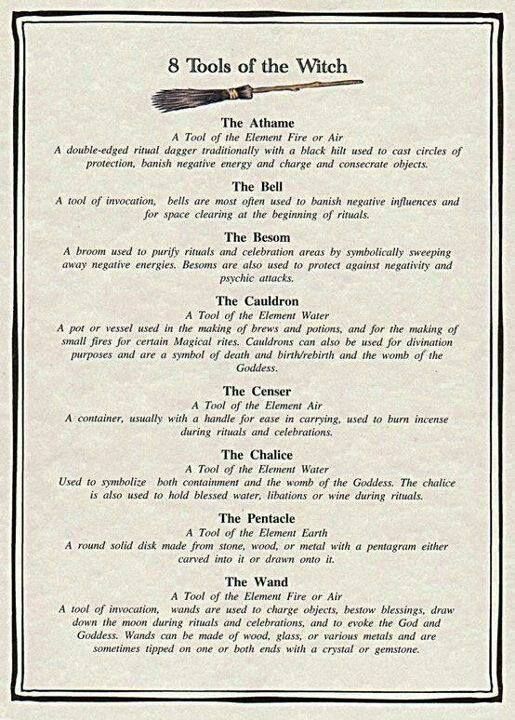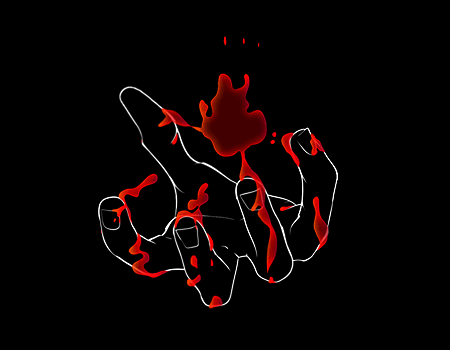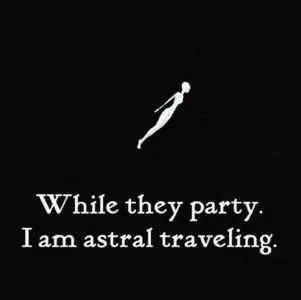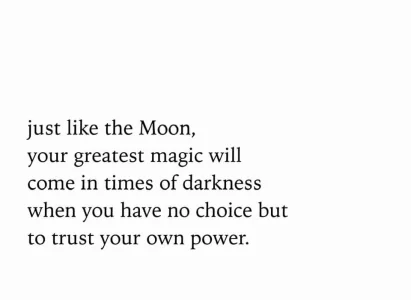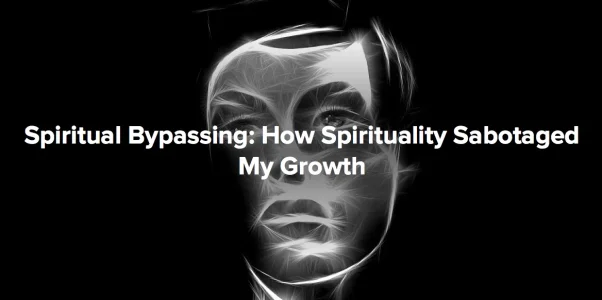You are using an out of date browser. It may not display this or other websites correctly.
You should upgrade or use an alternative browser.
You should upgrade or use an alternative browser.
Merkabah
- Thread starter Skarekrow
- Start date
More options
Who Replied?Skarekrow
~~DEVIL~~
- MBTI
- Ni-INFJ-A
- Enneagram
- Warlock
Haha yea, I was in it for about 15min and started seeing vague things. I've been in other dark areas experiencing similar stuff.
Pretty wild, though yea never freaked me out, I just find it super interesting lol. But I could see it being more anxiety ridden while spelunking, which adds other elements.
Yeah....for me it was really peaceful...like, you discover quite quickly if you are claustrophobic or not hahaha...for me it was almost the opposite...I mean there were always people to pull you out by your ankles if you couldn’t yourself...but you could be crawling through a small tunnel or squeeze for a while and you shut off your headlamp and it dark...and it’s almost like being in the womb of the earth as cheesy as that could sound.
A few times I thought I saw faces in the dark, but can’t say for sure...maybe so?
That would be scary as shit if those were real.
The world has a special quality in the early hours.
Its quiet, there's something funny about the air pressure and temperature.
There's a mental stillness that can only be experienced at certain times of the night.
I totally get you, but then I'm up at stupid o'clock all the time because of DSPD, so my mental clarity is greatest then anyway.
There's something very powerful about the combination of darkness and quiet - though it can be spooky and unsettling too.
I like places in the small hours that are deserted but are normally full of people.
Yes to both of you!
I lived in southern california at the time and it would get really hot where I was in the summer... and it would stay pretty warm all night sometimes also...but then about 4am it would cool off and that was the perfect coffee time...ah!
Loved that!
Thank you for the kind words @John K ♡
:<3white::<3white::<3white::<3white::<3white:
Roses In The Vineyard
Well-known member
- MBTI
- INFJ
This may have been written with the lens of anger...for that I apologize.
I still think they should pay taxes if they are going to own private jets (plural) and vacation homes, etc.
Disgusting.
Jesus would get all “moneychanger” on their asses.
You know what the book says about a rich man getting into heaven so I guess that part doesn’t exist at all...doesn’t apply to them since they are doing SOOO much for those suffering around them....and being SOOO modest?
This is everything to be despised about organized religion.
Making a bad name for those who are actually trying to live that life.
I’m sure they will probably be reincarnated as poor Hindu children in some tiny village....or maybe hedgehogs for a few years...just to ground them, you know?
lmao
Former pastors aid chiming in, I agree rich pastors are rich because they are parasites and these are the sort that I Love to piss off when given the opportunity. I like to come off nasty like an old testament prophet and boy do pastors get their panties in a knot. It is cancer like this that has been sucking the life out of the church since the second or third century and they are a vile bunch as they like to distort, twist, and pervert scripture to their own ends while some have gone to the lengths of having books stripped out of the bible during the roman era. Also the Christianity that people know today isn't even of the right tradition and lineage, the first church was of the Essenes. Now days all the church is just social clubs and emotional pseudo spiritual car wash to feel warm and fuzzy on Wednesday nights and Sunday mornings.
Skarekrow
~~DEVIL~~
- MBTI
- Ni-INFJ-A
- Enneagram
- Warlock
Former pastors aid chiming in, I agree rich pastors are rich because they are parasites and these are the sort that I Love to piss off when given the opportunity. I like to come off nasty like an old testament prophet and boy do pastors get their panties in a knot. It is cancer like this that has been sucking the life out of the church since the second or third century and they are a vile bunch as they like to distort, twist, and pervert scripture to their own ends while some have gone to the lengths of having books stripped out of the bible during the roman era. Also the Christianity that people know today isn't even of the right tradition and lineage, the first church was of the Essenes. Now days all the church is just social clubs and emotional pseudo spiritual car wash to feel warm and fuzzy on Wednesday nights and Sunday mornings.
Agree with you 100%...I have nothing to add, you said it all.
Skarekrow
~~DEVIL~~
- MBTI
- Ni-INFJ-A
- Enneagram
- Warlock
A good article on some ego traps and how to avoid!
Enjoy!
No one ever told me spirituality could be a self-sabotaging ego trap.
I spent about three years reading about spiritual teachings and incorporating them into my life before ever learning that spirituality has a dark side.
Naturally, I was taken aback.
I felt kind of betrayed.
How could something that seemed so pure and good be harmful?
The answer has to do with something that psychologists call spiritual bypassing.
In the early 1980s, psychologist John Welwood coined the term “spiritual bypassing” to refer to the use of spiritual practices and beliefs to avoid confronting uncomfortable feelings, unresolved wounds, and fundamental emotional and psychological needs.
According to integral psychotherapist Robert Augustus Masters, spiritual bypassing causes us to withdraw from ourselves and others, to hide behind a kind of spiritual veil of metaphysical beliefs and practices.
He says it “not only distances us from our pain and difficult personal issues, but also from our own authentic spirituality, stranding us in a metaphysical limbo, a zone of exaggerated gentleness, niceness, and superficiality.”
Painful Realizations: My Own Spiritual Bypassing
In Robert August Masters’ groundbreaking book, Spiritual Bypassing: When Spirituality Disconnects Us From What Really Matters, he writes:
“Aspects of spiritual bypassing include exaggerated detachment, emotional numbing and repression, overemphasis on the positive, anger-phobia, blind or overly tolerant compassion, weak or too porous boundaries, lopsided development (cognitive intelligence often being far ahead of emotional and moral intelligence), debilitating judgment about one’s negativity or shadow side, devaluation of the personal relative to the spiritual, and delusions of having arrived at a higher level of being.”
I encountered the concept of spiritual bypassing for the first time in Masters’ work.
Although I was reluctant to admit it, I immediately knew on some level that this concept applied to me.
As I continued to reflect on spiritual bypassing, I noticed more and more shadow aspects of spirituality, and I realized that I had unknowingly been enacting many of them at one time or another.
Though painful, these were some of the most important realizations I’ve ever had.
They’ve helped me to stop using a warped form of “spirituality” as an ego boost and to begin taking greater responsibility for addressing my psychological needs and the issues that arise in my life.
10 “Spiritual” Things People Do That Sabotage Their Growth
The best way to understand spiritual bypassing is through examples, so now, it’s time for some tough love.
I’m going to go into detail to describe ten specific shadow tendencies of spiritual people.
Caution: Some of these may hit pretty close to home.
Remember: You need not feel ashamed to admit that some of the items on this list apply to you.
I suspect some of them apply to everyone who has ever taken an interest in spirituality.
Most of them applied to me at one point or another, and some I’m still working through.
The goal here is not to judge, but to increase self-awareness in order to progress toward a more honest, empowering, useful spirituality.
Let’s get into it.
1. Participate in “spiritual” activities to make themselves feel superior to other people.
This is probably one of the most pervasive shadow aspects of spirituality, and it takes many forms.
Some people feel superior because they read Alan Watts.
Or ride their bike to work.
Or refrain from watching TV.
Or eat a vegetarian diet.
Or use crystals.
Or visit temples.
Or practice yoga or meditation.
Or take psychedelics.
Note that I’m not saying anything about the value of partaking of these activities.
I love Alan Watts, respect vegetarians, and think meditation is quite beneficial.
What I’m saying is that it’s alarmingly easy to allow your spiritual ideas and practices to become an ego trap—to believe that you’re so much better and more enlightened than all those other “sheeple” because you’re doing all of these rad #woke things.
Ultimately, this sort of attitude toward “spirituality” is no better than believing you’re better than everyone else because you’re a Democrat or a Lakers fan. This dysfunction actually inhibits genuine spirituality by causing us to focus on one-upping other people, rather than cultivating a sense of connection to the cosmos and feeling poetic wonder at the sublime grandeur of existence.
2. Use “spirituality” as a justification for failing to take responsibility for their actions.
The essence of the point is that it’s very easy to twist certain spiritual mantras or ideas into justifications for being irresponsible or unreliable.
“It is what it is.” or “The universe is already perfect.” or “Everything happens for a reason.” can all function as excellent justifications for never doing much of anything and never really examining one’s behavior.
I’m not commenting on the truth or un-truth of the above statements.
I’m just saying that if you’re consistently hours late for appointments, if you frequently neglect your close personal relationships, and your roommates can’t count on you to pay rent, you might want to stop telling yourself, “Whatever man, reality is an illusion anyway.” and start becoming someone others can depend on.
In a similar vein, it’s surprisingly easy to deceive yourself into thinking that anytime someone has a problem with your behavior, it’s because that person “isn’t honoring my truth” or “just needs to grow spiritually.”
It’s much more difficult to acknowledge the moments in which we act brashly, selfishly, or thoughtlessly and inflict suffering upon someone else.
It’s much more difficult to admit that we too are far from perfect, and that growth and learning are never-ending processes.
3. Adopt new hobbies, interests, and beliefs simply because they’re the latest “spiritual” fad.
Human beings want to fit in somewhere.
We all have a deep need to feel that we belong.
And we form groups of all kinds to satiate this need.
Spirituality is one interest area around which people form all sorts of groups.
This is potentially a great thing, but it also has a shadow aspect.
For many people, “spirituality” is little more than a hip thing that a lot of people seem to care about.
These people get the idea that they want to jump on the spiritual bandwagon, so they start practicing yoga, wearing New Age fashion items, going to music festivals, drinking ayahuasca, etc., and they tell themselves that this makes them “spiritual.”
These “spiritual scenesters” dilute the significance of genuine spiritual inquiry, contemplation, experience, and realization.
They also, in my experience, tend to be the “spiritual” people who are using “spirituality” as a reason to feel superior to others.
4. Judge others for expressing anger or other strong emotions, even when it’s necessary to do so.
This is one of the first patterns I noticed in myself after being introduced to spiritual bypassing.
I realized that when people became upset or angry with me, my response was to say things like, “Getting angry doesn’t help anything.” or “I feel we would have fewer problems if we could remain calm.”
Internally, I would silently judge the other person, thinking, “If only they were more enlightened, we could avoid this drama.”
In many situations, this was my way of avoiding deep issues that needed to be addressed.
When you become interested in spirituality, one of the first quotes you’re likely to encounter is: “Holding on to anger is like grasping a hot coal with the intent of harming another; you are the one who ends up getting burned.”
This quote is commonly misattributed to the Buddha, though it’s actually a paraphrase of a statement made by Buddhaghosa in the 5th century.
The subtle point of the quote is that we shouldn’t hold on to anger; we should feel it, express it if necessary, then let it go.
However, it’s very easy for the lay person to assume that this means that anger, in any form, is a sign that one is unwise, un-spiritual.
This is untrue.
Anger is a natural human emotion and a perfectly justifiable response to many situations.
Often, anger is an indicator that there are serious issues that need to be countenanced within oneself or one’s relationships.
Ironically, many spiritual people repress all “non-spiritual” emotions and artificially heighten “spiritual” emotions/traits such as compassion, kindness, and equanimity.
This leads to inauthenticity.
One struggles to constantly present oneself as calm, gentle, nice, and in a state of perpetual peace, and ultimately ends up looking and feeling like a fraud.
5. Use “spirituality” as a justification for excessive drug use.
A lot of people, myself included, believe that psychedelic drugs can occasion mystical experiences and enhance (secular) spirituality.
That’s all fine and good, but some people take this realization too far, using it as a way to rationalize self-destructive patterns of drug use and to blind themselves to the dark sides of various substances.
In the most extreme cases, “spiritual” people end up “performing cannabis ceremonies” during all their waking hours; taking psychedelics too frequently or in unsuitable contexts; and completely denying that these substances have any negative effects.
Now, we tend to be pro-psychedelics, but let me give it to you straight: Psychedelics, including cannabis, have a definite dark side.
If you’re irresponsible or simply unlucky, stronger psychedelics such as LSD or psilocybin mushrooms can occasion traumatic experiences with long-term negative ramifications.
And cannabis, a mild psychedelic, is a seductively habit-forming drug that will subtly cloud your mind and erode your motivation if you indulge too much, too frequently.
Respect the substances, and utilize them wisely.
6. Overemphasize “positivity” in order to avoid looking at the problems in their lives and in the world.
“Just be positive!” is often employed as a deflection mechanism by “spiritual” people who would rather not do the difficult work of confronting their own internal issues, wounding, and baggage, let alone the problems of the world.
The “positivity” movement has exploded in Western culture in recent years.
The Internet is overflowing with seemingly endless memes and articles repeating the same inane messages: “Think positive thoughts!” “Just be positive!” “Don’t focus on the negative!”
Though there is surely value in cultivating gratitude for the many marvels of the human experience, this movement seems to overlook something critical: The darker aspects of life do not disappear, simply because they are ignored.
In fact, many problems in our individual lives and on the global scale seem only to worsen or complexify when they are ignored.
In the same way that it would seem absurd to offer a heroine addict the phrase “Just think positive!” as a solution to their problem, it is absurd to believe that positive thinking offers any kind of solution to major global issues such as climate change, poverty, industrial farming, and existential risks.
This is not to say that we ought to take the world’s problems onto our shoulders and feel shitty about them all the time.
It’s healthy to recognize and feel optimistic about the fact that in many important ways, the world is getting better.
However, we need to balance that optimism with a willingness to confront real issues in our personal lives, our communities, our world.
7. Repress unpleasant emotions that don’t fit their “spiritual” self-narrative.
“No way, I can’t possibly be depressed or lonely or scared or anxious.
I love life too much, and I’m too [Zen / wise / enlightened] to allow that to happen anyway.”
I ran into this issue when I moved to South Korea to be an English teacher for a year.
I thought I had cultivated an unflappable chill, a Lao Tzu-esque ability to just “go with the flow” and float, bobber-like, atop the rising and falling waves of destiny.
Then I experienced culture shock, crushing loneliness, and acute homesickness, and I had to admit to myself that I wasn’t some kind of Zen master after all.
Or rather, I had to realize that the ability to “go with the flow” and accept whatever is happening is perennially valuable, but that sometimes that will mean accepting that you feel like a steaming pile of shit.
It’s easy to delude oneself into believing that spirituality is going to make life feel like endlessly floating upon a cloud, but in practice, this is not the case. Life is still full of suffering, and in order to really grow and learn from our experience, we need to be honest with ourselves about what we’re feeling and let ourselves feel it fully.
In my case, my desire to always be “Zen,” to “go with the flow,” and to project an image of inner peace to myself and others prevented me from seeing the truth of various situations/experiences and taking responsibility for dealing with them.
8. Feel deep aversion and self-loathing when confronted with their shadow side.
I noticed this in myself pretty quickly after learning about spiritual bypassing.
I saw that my narcissistic image of myself as a wise person who had attained “higher” realizations was causing a ridiculous amount of cognitive dissonance.
I judged myself scathingly and felt colossal, crushing guilt over any less-than-virtuous decisions.
When you become interested in spirituality, it’s easy to idolize people like the Buddha or the Dalai Lama, and to believe that these people are Perfect Humans who always act with complete awareness and compassion.
In actuality, this is almost certainly not the case.
Even if it’s true that some humans reach a level of realization at which they uphold “right action” in all circumstances, we need to acknowledge that such a thing is reserved for the very few.
I personally suspect that such a thing does not exist.
In actuality, we’re all fallible humans, and we’re all going to make mistakes.
The deck is stacked against us.
It’s virtually impossible to live even a few weeks of adult human life without committing a few blunders, if only minor ones.
Over the course of years, there will be major mistakes.
It happens to all of us, and it’s okay.
Forgive yourself.
All you can do is learn from your errors and strive to do better in the future.
Paradoxically, the seemingly spiritual lesson of self-forgiveness can be especially difficult to internalize for people interested in spirituality.
Spiritual teachings can leave one with stratospherically high ideals that result in immense guilt and self-loathing when one fails to live up to them.
This is a major reason why it’s so common for spiritual people to deflect responsibility—because being honest about their shortcomings would be too painful.
Ironically, we must be honest with ourselves about our mistakes in order to learn from them and grow into more self-aware, compassionate versions of ourselves.
Just remember:
You’re only human.
It’s okay to make mistakes.
Really, it’s okay.
But admit to yourself when you’ve made a mistake and learn from it.
9. Find themselves in bad situations due to excessive tolerance and a refusal to distinguish between people.
This is me, 100%.
For a long time, I’ve taken very seriously the idea that every human being deserves compassion and kindness.
I don’t disagree with that idea nowadays, but I’ve realized that there are numerous situations in which other considerations should temporarily override my desire to treat every other human compassionately.
In multiple foreign countries, I’ve found myself in potentially life-threatening situations because I was overly trusting of people I did not know or overly kind to people who I should have recognized as shady characters.
Luckily, I’ve never gotten hurt in these situations, but I have been robbed and swindled several times.
In every case, I wanted to believe that the people I was interacting with were “good” people at heart and would treat me with kindness if I did so for them.
That line of thinking was terribly naive, and I’m still trying to re-condition myself to understand that in certain contexts, being warm is not the answer.
The sad fact is that although you might be insulated from it, the struggle for survival is still very real for vast numbers of people on this planet.
Many people have grown up in poverty, surrounded by crime, and have learned that the only way to survive is by preying upon weakness.
The majority of people worldwide seem not to have this mentality, but if you find yourself in a city or country in which poverty is fairly prevalent, you should take certain common-sense precautions—basic things, like:
1. Don’t walk anywhere alone after dark.
2. Try to stay away from vacant areas.
3. Don’t stop to engage with people who try to sell you things.
4. Make distinctions between people; let yourself know that it’s okay to trust your brain’s highly evolved pattern-matching mechanism when it tells you that someone looks like they’re on drugs, deranged, desperate, or dangerous.
10. Want so badly for various “spiritual” practices to be correct that they disregard science entirely.
There’s a pretty heavily anti-scientific streak in a lot of the spiritual community, and I think this is a shame.
It seems to me that many spiritual people become hostile toward science because certain beliefs and practices they find valuable are considered unproven or pseudoscientific within the scientific community.
If a belief or practice is unproven or pseudoscientific, this only means that we have not yet been able to confirm its validity through repeatable experimentation in a lab setting.
It doesn’t mean that it isn’t true or valuable.
The scientific method is one of the best tools we have for understanding the mechanics of the observable universe; it allowed us to discover the profound truth of biological evolution, observe the far reaches of space, extend our lifespans by decades, and walk on the moon, among other things; to discard it entirely is to lose one of our most powerful lenses for understanding reality.
As Carl Sagan memorably put it:
“Science is not only compatible with spirituality; it is a profound source of spirituality. When we recognize our place in an immensity of light years and in the passage of ages, when we grasp the intricacy, beauty and subtlety of life, then that soaring feeling, that sense of elation and humility combined, is surely spiritual. So are our emotions in the presence of great art or music or literature, or of acts of exemplary selfless courage such as those of Mohandas Gandhi or Martin Luther King Jr. The notion that science and spirituality are somehow mutually exclusive does a disservice to both.”
Bonus: Miss out on material success because of a belief that money and capitalism are evil.
A lot of “spiritual” people sabotage their own ability to succeed materially.
This is because they are seemingly allergic to wealth, associating money with greed, impurity, and general malevolence.
Capitalism is viewed as an engine of inequality and corruption that must be dismantled.
I used to hold a version of this view myself, so I realize how seductive it is.
If you’re drawn to spirituality, it feels natural to scorn “materialism.”
In truth, though, this narrative is too simplistic.
The truth about capitalism is complex.
Yes, capitalism has some very real downsides, but in many ways, regulated capitalism has been a force for tremendous good, spurring massive innovation, skyrocketing the global standard of living, and pulling billions of people out of poverty globally.
In 1820, 94% of the people on Earth were living in extreme poverty.
By 2015, that figure had dropped to a mere 9.6%, largely thanks to economic growth catalyzed by regulated capitalism:

Perhaps the most uplifting chart in existence.
Furthermore, let me give it to you straight again:
There’s nothing inherently wrong with wanting to make money.
Money is an amazing tool.
Billionaires like Elon Musk and Bill Gates who are using their wealth to help the world in momentous ways prove that money can be used benevolently or nefariously.
Consider also the 139 billionaires and hundred-millionaires who have pledged to donate a total of $365 billion to charitable causes in their lifetimes.
We actually need more compassionate people to gain substantial wealth, so they can use it effectively and altruistically to improve the world.

Meme disclaimer: These memes are not meant to have any connection to an actual person.
This person should be considered an actress posing as a spiritual bypasser.
Now, with all of that being said, I need to say this:
We still may need to gradually transcend capitalism.
Capitalism has served an evolutionary purpose for humanity, catalyzing the creation of world-improving technologies and raising the global standard of living immensely.
However, it also has some serious flaws, like externalizing massive costs upon the environment and driving the rapid imprudent development of nanotechnology, genetic engineering, and other technologies that could be weaponized catastrophically and decimate the biosphere.
It’s possible we can eliminate these flaws through legislation and regulation, but we may need to move beyond capitalism altogether.
Thus, I’m in favor of a gradual, methodical, data-driven approach to testing and implementing new ideas in economics that solve capitalism’s incentive problems.
If you’re curious to think more about capitalism, I highly recommend this extremely balanced, incisive lecture by Jonathan Haidt, exploring the pros and cons of capitalism.
We’re All Learning…
I think that in order for the various interconnected global spiritual movements to be maximally impactful and useful, they need to address their shadow aspects.
In this essay, I have attempted to illuminate some of the blind spots that seem to be prevalent in the spiritual community.
As I’ve said, most of the items I discussed applied to me at one point or another.
It’s decidedly easy to fall into some of the traps of spirituality and to harbor various limiting beliefs and behaviors while feeling like one has reached a “higher” level of being.
The lesson here is that growth and learning are unending processes.
If you think you have nothing left to learn, you’re probably sabotaging yourself in a number of ways.
It can be profoundly difficult to admit that for a long time one has been incorrect or misguided, but the alternative is much worse.
The alternative is a kind of spiritual and intellectual death—a state of perpetual stagnation in which one endlessly deludes oneself into thinking that one has all the answers, that one has reached one’s Final Form.
In a rapidly changing world, continual learning is of paramount importance.
At its best, spirituality is a force that can help humanity realize our common identity as sentient beings, gain ecological awareness, feel connected to our cosmos, and address the most pressing issues of our time with compassion, ingenuity, equanimity, and what Einstein called a “holy curiosity.”
At its best, spirituality is a force which propels us toward a more harmonious, cooperative, sustainable future.
Here’s to refining our collective spirituality and co-creating a more beautiful world.
Enjoy!
No one ever told me spirituality could be a self-sabotaging ego trap.
I spent about three years reading about spiritual teachings and incorporating them into my life before ever learning that spirituality has a dark side.
Naturally, I was taken aback.
I felt kind of betrayed.
How could something that seemed so pure and good be harmful?
The answer has to do with something that psychologists call spiritual bypassing.
In the early 1980s, psychologist John Welwood coined the term “spiritual bypassing” to refer to the use of spiritual practices and beliefs to avoid confronting uncomfortable feelings, unresolved wounds, and fundamental emotional and psychological needs.
According to integral psychotherapist Robert Augustus Masters, spiritual bypassing causes us to withdraw from ourselves and others, to hide behind a kind of spiritual veil of metaphysical beliefs and practices.
He says it “not only distances us from our pain and difficult personal issues, but also from our own authentic spirituality, stranding us in a metaphysical limbo, a zone of exaggerated gentleness, niceness, and superficiality.”
Painful Realizations: My Own Spiritual Bypassing
In Robert August Masters’ groundbreaking book, Spiritual Bypassing: When Spirituality Disconnects Us From What Really Matters, he writes:
“Aspects of spiritual bypassing include exaggerated detachment, emotional numbing and repression, overemphasis on the positive, anger-phobia, blind or overly tolerant compassion, weak or too porous boundaries, lopsided development (cognitive intelligence often being far ahead of emotional and moral intelligence), debilitating judgment about one’s negativity or shadow side, devaluation of the personal relative to the spiritual, and delusions of having arrived at a higher level of being.”
I encountered the concept of spiritual bypassing for the first time in Masters’ work.
Although I was reluctant to admit it, I immediately knew on some level that this concept applied to me.
As I continued to reflect on spiritual bypassing, I noticed more and more shadow aspects of spirituality, and I realized that I had unknowingly been enacting many of them at one time or another.
Though painful, these were some of the most important realizations I’ve ever had.
They’ve helped me to stop using a warped form of “spirituality” as an ego boost and to begin taking greater responsibility for addressing my psychological needs and the issues that arise in my life.
10 “Spiritual” Things People Do That Sabotage Their Growth
The best way to understand spiritual bypassing is through examples, so now, it’s time for some tough love.
I’m going to go into detail to describe ten specific shadow tendencies of spiritual people.
Caution: Some of these may hit pretty close to home.
Remember: You need not feel ashamed to admit that some of the items on this list apply to you.
I suspect some of them apply to everyone who has ever taken an interest in spirituality.
Most of them applied to me at one point or another, and some I’m still working through.
The goal here is not to judge, but to increase self-awareness in order to progress toward a more honest, empowering, useful spirituality.
Let’s get into it.
1. Participate in “spiritual” activities to make themselves feel superior to other people.
This is probably one of the most pervasive shadow aspects of spirituality, and it takes many forms.
Some people feel superior because they read Alan Watts.
Or ride their bike to work.
Or refrain from watching TV.
Or eat a vegetarian diet.
Or use crystals.
Or visit temples.
Or practice yoga or meditation.
Or take psychedelics.
Note that I’m not saying anything about the value of partaking of these activities.
I love Alan Watts, respect vegetarians, and think meditation is quite beneficial.
What I’m saying is that it’s alarmingly easy to allow your spiritual ideas and practices to become an ego trap—to believe that you’re so much better and more enlightened than all those other “sheeple” because you’re doing all of these rad #woke things.
Ultimately, this sort of attitude toward “spirituality” is no better than believing you’re better than everyone else because you’re a Democrat or a Lakers fan. This dysfunction actually inhibits genuine spirituality by causing us to focus on one-upping other people, rather than cultivating a sense of connection to the cosmos and feeling poetic wonder at the sublime grandeur of existence.
2. Use “spirituality” as a justification for failing to take responsibility for their actions.
The essence of the point is that it’s very easy to twist certain spiritual mantras or ideas into justifications for being irresponsible or unreliable.
“It is what it is.” or “The universe is already perfect.” or “Everything happens for a reason.” can all function as excellent justifications for never doing much of anything and never really examining one’s behavior.
I’m not commenting on the truth or un-truth of the above statements.
I’m just saying that if you’re consistently hours late for appointments, if you frequently neglect your close personal relationships, and your roommates can’t count on you to pay rent, you might want to stop telling yourself, “Whatever man, reality is an illusion anyway.” and start becoming someone others can depend on.
In a similar vein, it’s surprisingly easy to deceive yourself into thinking that anytime someone has a problem with your behavior, it’s because that person “isn’t honoring my truth” or “just needs to grow spiritually.”
It’s much more difficult to acknowledge the moments in which we act brashly, selfishly, or thoughtlessly and inflict suffering upon someone else.
It’s much more difficult to admit that we too are far from perfect, and that growth and learning are never-ending processes.
3. Adopt new hobbies, interests, and beliefs simply because they’re the latest “spiritual” fad.
Human beings want to fit in somewhere.
We all have a deep need to feel that we belong.
And we form groups of all kinds to satiate this need.
Spirituality is one interest area around which people form all sorts of groups.
This is potentially a great thing, but it also has a shadow aspect.
For many people, “spirituality” is little more than a hip thing that a lot of people seem to care about.
These people get the idea that they want to jump on the spiritual bandwagon, so they start practicing yoga, wearing New Age fashion items, going to music festivals, drinking ayahuasca, etc., and they tell themselves that this makes them “spiritual.”
These “spiritual scenesters” dilute the significance of genuine spiritual inquiry, contemplation, experience, and realization.
They also, in my experience, tend to be the “spiritual” people who are using “spirituality” as a reason to feel superior to others.
4. Judge others for expressing anger or other strong emotions, even when it’s necessary to do so.
This is one of the first patterns I noticed in myself after being introduced to spiritual bypassing.
I realized that when people became upset or angry with me, my response was to say things like, “Getting angry doesn’t help anything.” or “I feel we would have fewer problems if we could remain calm.”
Internally, I would silently judge the other person, thinking, “If only they were more enlightened, we could avoid this drama.”
In many situations, this was my way of avoiding deep issues that needed to be addressed.
When you become interested in spirituality, one of the first quotes you’re likely to encounter is: “Holding on to anger is like grasping a hot coal with the intent of harming another; you are the one who ends up getting burned.”
This quote is commonly misattributed to the Buddha, though it’s actually a paraphrase of a statement made by Buddhaghosa in the 5th century.
The subtle point of the quote is that we shouldn’t hold on to anger; we should feel it, express it if necessary, then let it go.
However, it’s very easy for the lay person to assume that this means that anger, in any form, is a sign that one is unwise, un-spiritual.
This is untrue.
Anger is a natural human emotion and a perfectly justifiable response to many situations.
Often, anger is an indicator that there are serious issues that need to be countenanced within oneself or one’s relationships.
Ironically, many spiritual people repress all “non-spiritual” emotions and artificially heighten “spiritual” emotions/traits such as compassion, kindness, and equanimity.
This leads to inauthenticity.
One struggles to constantly present oneself as calm, gentle, nice, and in a state of perpetual peace, and ultimately ends up looking and feeling like a fraud.
5. Use “spirituality” as a justification for excessive drug use.
A lot of people, myself included, believe that psychedelic drugs can occasion mystical experiences and enhance (secular) spirituality.
That’s all fine and good, but some people take this realization too far, using it as a way to rationalize self-destructive patterns of drug use and to blind themselves to the dark sides of various substances.
In the most extreme cases, “spiritual” people end up “performing cannabis ceremonies” during all their waking hours; taking psychedelics too frequently or in unsuitable contexts; and completely denying that these substances have any negative effects.
Now, we tend to be pro-psychedelics, but let me give it to you straight: Psychedelics, including cannabis, have a definite dark side.
If you’re irresponsible or simply unlucky, stronger psychedelics such as LSD or psilocybin mushrooms can occasion traumatic experiences with long-term negative ramifications.
And cannabis, a mild psychedelic, is a seductively habit-forming drug that will subtly cloud your mind and erode your motivation if you indulge too much, too frequently.
Respect the substances, and utilize them wisely.
6. Overemphasize “positivity” in order to avoid looking at the problems in their lives and in the world.
“Just be positive!” is often employed as a deflection mechanism by “spiritual” people who would rather not do the difficult work of confronting their own internal issues, wounding, and baggage, let alone the problems of the world.
The “positivity” movement has exploded in Western culture in recent years.
The Internet is overflowing with seemingly endless memes and articles repeating the same inane messages: “Think positive thoughts!” “Just be positive!” “Don’t focus on the negative!”
Though there is surely value in cultivating gratitude for the many marvels of the human experience, this movement seems to overlook something critical: The darker aspects of life do not disappear, simply because they are ignored.
In fact, many problems in our individual lives and on the global scale seem only to worsen or complexify when they are ignored.
In the same way that it would seem absurd to offer a heroine addict the phrase “Just think positive!” as a solution to their problem, it is absurd to believe that positive thinking offers any kind of solution to major global issues such as climate change, poverty, industrial farming, and existential risks.
This is not to say that we ought to take the world’s problems onto our shoulders and feel shitty about them all the time.
It’s healthy to recognize and feel optimistic about the fact that in many important ways, the world is getting better.
However, we need to balance that optimism with a willingness to confront real issues in our personal lives, our communities, our world.
7. Repress unpleasant emotions that don’t fit their “spiritual” self-narrative.
“No way, I can’t possibly be depressed or lonely or scared or anxious.
I love life too much, and I’m too [Zen / wise / enlightened] to allow that to happen anyway.”
I ran into this issue when I moved to South Korea to be an English teacher for a year.
I thought I had cultivated an unflappable chill, a Lao Tzu-esque ability to just “go with the flow” and float, bobber-like, atop the rising and falling waves of destiny.
Then I experienced culture shock, crushing loneliness, and acute homesickness, and I had to admit to myself that I wasn’t some kind of Zen master after all.
Or rather, I had to realize that the ability to “go with the flow” and accept whatever is happening is perennially valuable, but that sometimes that will mean accepting that you feel like a steaming pile of shit.
It’s easy to delude oneself into believing that spirituality is going to make life feel like endlessly floating upon a cloud, but in practice, this is not the case. Life is still full of suffering, and in order to really grow and learn from our experience, we need to be honest with ourselves about what we’re feeling and let ourselves feel it fully.
In my case, my desire to always be “Zen,” to “go with the flow,” and to project an image of inner peace to myself and others prevented me from seeing the truth of various situations/experiences and taking responsibility for dealing with them.
8. Feel deep aversion and self-loathing when confronted with their shadow side.
I noticed this in myself pretty quickly after learning about spiritual bypassing.
I saw that my narcissistic image of myself as a wise person who had attained “higher” realizations was causing a ridiculous amount of cognitive dissonance.
I judged myself scathingly and felt colossal, crushing guilt over any less-than-virtuous decisions.
When you become interested in spirituality, it’s easy to idolize people like the Buddha or the Dalai Lama, and to believe that these people are Perfect Humans who always act with complete awareness and compassion.
In actuality, this is almost certainly not the case.
Even if it’s true that some humans reach a level of realization at which they uphold “right action” in all circumstances, we need to acknowledge that such a thing is reserved for the very few.
I personally suspect that such a thing does not exist.
In actuality, we’re all fallible humans, and we’re all going to make mistakes.
The deck is stacked against us.
It’s virtually impossible to live even a few weeks of adult human life without committing a few blunders, if only minor ones.
Over the course of years, there will be major mistakes.
It happens to all of us, and it’s okay.
Forgive yourself.
All you can do is learn from your errors and strive to do better in the future.
Paradoxically, the seemingly spiritual lesson of self-forgiveness can be especially difficult to internalize for people interested in spirituality.
Spiritual teachings can leave one with stratospherically high ideals that result in immense guilt and self-loathing when one fails to live up to them.
This is a major reason why it’s so common for spiritual people to deflect responsibility—because being honest about their shortcomings would be too painful.
Ironically, we must be honest with ourselves about our mistakes in order to learn from them and grow into more self-aware, compassionate versions of ourselves.
Just remember:
You’re only human.
It’s okay to make mistakes.
Really, it’s okay.
But admit to yourself when you’ve made a mistake and learn from it.
9. Find themselves in bad situations due to excessive tolerance and a refusal to distinguish between people.
This is me, 100%.
For a long time, I’ve taken very seriously the idea that every human being deserves compassion and kindness.
I don’t disagree with that idea nowadays, but I’ve realized that there are numerous situations in which other considerations should temporarily override my desire to treat every other human compassionately.
In multiple foreign countries, I’ve found myself in potentially life-threatening situations because I was overly trusting of people I did not know or overly kind to people who I should have recognized as shady characters.
Luckily, I’ve never gotten hurt in these situations, but I have been robbed and swindled several times.
In every case, I wanted to believe that the people I was interacting with were “good” people at heart and would treat me with kindness if I did so for them.
That line of thinking was terribly naive, and I’m still trying to re-condition myself to understand that in certain contexts, being warm is not the answer.
The sad fact is that although you might be insulated from it, the struggle for survival is still very real for vast numbers of people on this planet.
Many people have grown up in poverty, surrounded by crime, and have learned that the only way to survive is by preying upon weakness.
The majority of people worldwide seem not to have this mentality, but if you find yourself in a city or country in which poverty is fairly prevalent, you should take certain common-sense precautions—basic things, like:
1. Don’t walk anywhere alone after dark.
2. Try to stay away from vacant areas.
3. Don’t stop to engage with people who try to sell you things.
4. Make distinctions between people; let yourself know that it’s okay to trust your brain’s highly evolved pattern-matching mechanism when it tells you that someone looks like they’re on drugs, deranged, desperate, or dangerous.
10. Want so badly for various “spiritual” practices to be correct that they disregard science entirely.
There’s a pretty heavily anti-scientific streak in a lot of the spiritual community, and I think this is a shame.
It seems to me that many spiritual people become hostile toward science because certain beliefs and practices they find valuable are considered unproven or pseudoscientific within the scientific community.
If a belief or practice is unproven or pseudoscientific, this only means that we have not yet been able to confirm its validity through repeatable experimentation in a lab setting.
It doesn’t mean that it isn’t true or valuable.
The scientific method is one of the best tools we have for understanding the mechanics of the observable universe; it allowed us to discover the profound truth of biological evolution, observe the far reaches of space, extend our lifespans by decades, and walk on the moon, among other things; to discard it entirely is to lose one of our most powerful lenses for understanding reality.
As Carl Sagan memorably put it:
“Science is not only compatible with spirituality; it is a profound source of spirituality. When we recognize our place in an immensity of light years and in the passage of ages, when we grasp the intricacy, beauty and subtlety of life, then that soaring feeling, that sense of elation and humility combined, is surely spiritual. So are our emotions in the presence of great art or music or literature, or of acts of exemplary selfless courage such as those of Mohandas Gandhi or Martin Luther King Jr. The notion that science and spirituality are somehow mutually exclusive does a disservice to both.”
Bonus: Miss out on material success because of a belief that money and capitalism are evil.
A lot of “spiritual” people sabotage their own ability to succeed materially.
This is because they are seemingly allergic to wealth, associating money with greed, impurity, and general malevolence.
Capitalism is viewed as an engine of inequality and corruption that must be dismantled.
I used to hold a version of this view myself, so I realize how seductive it is.
If you’re drawn to spirituality, it feels natural to scorn “materialism.”
In truth, though, this narrative is too simplistic.
The truth about capitalism is complex.
Yes, capitalism has some very real downsides, but in many ways, regulated capitalism has been a force for tremendous good, spurring massive innovation, skyrocketing the global standard of living, and pulling billions of people out of poverty globally.
In 1820, 94% of the people on Earth were living in extreme poverty.
By 2015, that figure had dropped to a mere 9.6%, largely thanks to economic growth catalyzed by regulated capitalism:

Perhaps the most uplifting chart in existence.
Furthermore, let me give it to you straight again:
There’s nothing inherently wrong with wanting to make money.
Money is an amazing tool.
Billionaires like Elon Musk and Bill Gates who are using their wealth to help the world in momentous ways prove that money can be used benevolently or nefariously.
Consider also the 139 billionaires and hundred-millionaires who have pledged to donate a total of $365 billion to charitable causes in their lifetimes.
We actually need more compassionate people to gain substantial wealth, so they can use it effectively and altruistically to improve the world.

Meme disclaimer: These memes are not meant to have any connection to an actual person.
This person should be considered an actress posing as a spiritual bypasser.
Now, with all of that being said, I need to say this:
We still may need to gradually transcend capitalism.
Capitalism has served an evolutionary purpose for humanity, catalyzing the creation of world-improving technologies and raising the global standard of living immensely.
However, it also has some serious flaws, like externalizing massive costs upon the environment and driving the rapid imprudent development of nanotechnology, genetic engineering, and other technologies that could be weaponized catastrophically and decimate the biosphere.
It’s possible we can eliminate these flaws through legislation and regulation, but we may need to move beyond capitalism altogether.
Thus, I’m in favor of a gradual, methodical, data-driven approach to testing and implementing new ideas in economics that solve capitalism’s incentive problems.
If you’re curious to think more about capitalism, I highly recommend this extremely balanced, incisive lecture by Jonathan Haidt, exploring the pros and cons of capitalism.
We’re All Learning…
I think that in order for the various interconnected global spiritual movements to be maximally impactful and useful, they need to address their shadow aspects.
In this essay, I have attempted to illuminate some of the blind spots that seem to be prevalent in the spiritual community.
As I’ve said, most of the items I discussed applied to me at one point or another.
It’s decidedly easy to fall into some of the traps of spirituality and to harbor various limiting beliefs and behaviors while feeling like one has reached a “higher” level of being.
The lesson here is that growth and learning are unending processes.
If you think you have nothing left to learn, you’re probably sabotaging yourself in a number of ways.
It can be profoundly difficult to admit that for a long time one has been incorrect or misguided, but the alternative is much worse.
The alternative is a kind of spiritual and intellectual death—a state of perpetual stagnation in which one endlessly deludes oneself into thinking that one has all the answers, that one has reached one’s Final Form.
In a rapidly changing world, continual learning is of paramount importance.
At its best, spirituality is a force that can help humanity realize our common identity as sentient beings, gain ecological awareness, feel connected to our cosmos, and address the most pressing issues of our time with compassion, ingenuity, equanimity, and what Einstein called a “holy curiosity.”
At its best, spirituality is a force which propels us toward a more harmonious, cooperative, sustainable future.
Here’s to refining our collective spirituality and co-creating a more beautiful world.
Skarekrow
~~DEVIL~~
- MBTI
- Ni-INFJ-A
- Enneagram
- Warlock
You will never find me with one of these in my home.
I’m sure they already listen in as it is on other devices...I don’t need one specifically designed for that...fuck off!
Some of these are probably programming jokes..but others and just scary.
Anyhow...no...if you have one of these type devices...what are your thoughts?
I’m sure they already listen in as it is on other devices...I don’t need one specifically designed for that...fuck off!
Some of these are probably programming jokes..but others and just scary.
Anyhow...no...if you have one of these type devices...what are your thoughts?
Skarekrow
~~DEVIL~~
- MBTI
- Ni-INFJ-A
- Enneagram
- Warlock
So the internet was all screwy this morning and kept going out or not connecting to pages at all.
I call my ISP and the guy is like...”Um...can you call back in....3 hours or so....our internet here is down too and I can’t really diagnose your problem.”.
I said - “Thanks, I’m sure it has something to do with YOUR internet being out.”
Lmao
It came back on shortly thereafter.

I call my ISP and the guy is like...”Um...can you call back in....3 hours or so....our internet here is down too and I can’t really diagnose your problem.”.
I said - “Thanks, I’m sure it has something to do with YOUR internet being out.”
Lmao
It came back on shortly thereafter.
JennyDaniella
Stargazer
- MBTI
- INFJ
- Enneagram
- 925
The first one made me chuckle haha.
Also good makeup tip! I shall do that.
D
Deleted member 16771
That was a great article, Skare.A good article on some ego traps and how to avoid!
Enjoy!
No one ever told me spirituality could be a self-sabotaging ego trap.
I spent about three years reading about spiritual teachings and incorporating them into my life before ever learning that spirituality has a dark side.
Naturally, I was taken aback.
I felt kind of betrayed.
How could something that seemed so pure and good be harmful?
The answer has to do with something that psychologists call spiritual bypassing.
In the early 1980s, psychologist John Welwood coined the term “spiritual bypassing” to refer to the use of spiritual practices and beliefs to avoid confronting uncomfortable feelings, unresolved wounds, and fundamental emotional and psychological needs.
According to integral psychotherapist Robert Augustus Masters, spiritual bypassing causes us to withdraw from ourselves and others, to hide behind a kind of spiritual veil of metaphysical beliefs and practices.
He says it “not only distances us from our pain and difficult personal issues, but also from our own authentic spirituality, stranding us in a metaphysical limbo, a zone of exaggerated gentleness, niceness, and superficiality.”
Painful Realizations: My Own Spiritual Bypassing
In Robert August Masters’ groundbreaking book, Spiritual Bypassing: When Spirituality Disconnects Us From What Really Matters, he writes:
“Aspects of spiritual bypassing include exaggerated detachment, emotional numbing and repression, overemphasis on the positive, anger-phobia, blind or overly tolerant compassion, weak or too porous boundaries, lopsided development (cognitive intelligence often being far ahead of emotional and moral intelligence), debilitating judgment about one’s negativity or shadow side, devaluation of the personal relative to the spiritual, and delusions of having arrived at a higher level of being.”
I encountered the concept of spiritual bypassing for the first time in Masters’ work.
Although I was reluctant to admit it, I immediately knew on some level that this concept applied to me.
As I continued to reflect on spiritual bypassing, I noticed more and more shadow aspects of spirituality, and I realized that I had unknowingly been enacting many of them at one time or another.
Though painful, these were some of the most important realizations I’ve ever had.
They’ve helped me to stop using a warped form of “spirituality” as an ego boost and to begin taking greater responsibility for addressing my psychological needs and the issues that arise in my life.
10 “Spiritual” Things People Do That Sabotage Their Growth
The best way to understand spiritual bypassing is through examples, so now, it’s time for some tough love.
I’m going to go into detail to describe ten specific shadow tendencies of spiritual people.
Caution: Some of these may hit pretty close to home.
Remember: You need not feel ashamed to admit that some of the items on this list apply to you.
I suspect some of them apply to everyone who has ever taken an interest in spirituality.
Most of them applied to me at one point or another, and some I’m still working through.
The goal here is not to judge, but to increase self-awareness in order to progress toward a more honest, empowering, useful spirituality.
Let’s get into it.
1. Participate in “spiritual” activities to make themselves feel superior to other people.
This is probably one of the most pervasive shadow aspects of spirituality, and it takes many forms.
Some people feel superior because they read Alan Watts.
Or ride their bike to work.
Or refrain from watching TV.
Or eat a vegetarian diet.
Or use crystals.
Or visit temples.
Or practice yoga or meditation.
Or take psychedelics.
Note that I’m not saying anything about the value of partaking of these activities.
I love Alan Watts, respect vegetarians, and think meditation is quite beneficial.
What I’m saying is that it’s alarmingly easy to allow your spiritual ideas and practices to become an ego trap—to believe that you’re so much better and more enlightened than all those other “sheeple” because you’re doing all of these rad #woke things.
Ultimately, this sort of attitude toward “spirituality” is no better than believing you’re better than everyone else because you’re a Democrat or a Lakers fan. This dysfunction actually inhibits genuine spirituality by causing us to focus on one-upping other people, rather than cultivating a sense of connection to the cosmos and feeling poetic wonder at the sublime grandeur of existence.
2. Use “spirituality” as a justification for failing to take responsibility for their actions.
The essence of the point is that it’s very easy to twist certain spiritual mantras or ideas into justifications for being irresponsible or unreliable.
“It is what it is.” or “The universe is already perfect.” or “Everything happens for a reason.” can all function as excellent justifications for never doing much of anything and never really examining one’s behavior.
I’m not commenting on the truth or un-truth of the above statements.
I’m just saying that if you’re consistently hours late for appointments, if you frequently neglect your close personal relationships, and your roommates can’t count on you to pay rent, you might want to stop telling yourself, “Whatever man, reality is an illusion anyway.” and start becoming someone others can depend on.
In a similar vein, it’s surprisingly easy to deceive yourself into thinking that anytime someone has a problem with your behavior, it’s because that person “isn’t honoring my truth” or “just needs to grow spiritually.”
It’s much more difficult to acknowledge the moments in which we act brashly, selfishly, or thoughtlessly and inflict suffering upon someone else.
It’s much more difficult to admit that we too are far from perfect, and that growth and learning are never-ending processes.
3. Adopt new hobbies, interests, and beliefs simply because they’re the latest “spiritual” fad.
Human beings want to fit in somewhere.
We all have a deep need to feel that we belong.
And we form groups of all kinds to satiate this need.
Spirituality is one interest area around which people form all sorts of groups.
This is potentially a great thing, but it also has a shadow aspect.
For many people, “spirituality” is little more than a hip thing that a lot of people seem to care about.
These people get the idea that they want to jump on the spiritual bandwagon, so they start practicing yoga, wearing New Age fashion items, going to music festivals, drinking ayahuasca, etc., and they tell themselves that this makes them “spiritual.”
These “spiritual scenesters” dilute the significance of genuine spiritual inquiry, contemplation, experience, and realization.
They also, in my experience, tend to be the “spiritual” people who are using “spirituality” as a reason to feel superior to others.
4. Judge others for expressing anger or other strong emotions, even when it’s necessary to do so.
This is one of the first patterns I noticed in myself after being introduced to spiritual bypassing.
I realized that when people became upset or angry with me, my response was to say things like, “Getting angry doesn’t help anything.” or “I feel we would have fewer problems if we could remain calm.”
Internally, I would silently judge the other person, thinking, “If only they were more enlightened, we could avoid this drama.”
In many situations, this was my way of avoiding deep issues that needed to be addressed.
When you become interested in spirituality, one of the first quotes you’re likely to encounter is: “Holding on to anger is like grasping a hot coal with the intent of harming another; you are the one who ends up getting burned.”
This quote is commonly misattributed to the Buddha, though it’s actually a paraphrase of a statement made by Buddhaghosa in the 5th century.
The subtle point of the quote is that we shouldn’t hold on to anger; we should feel it, express it if necessary, then let it go.
However, it’s very easy for the lay person to assume that this means that anger, in any form, is a sign that one is unwise, un-spiritual.
This is untrue.
Anger is a natural human emotion and a perfectly justifiable response to many situations.
Often, anger is an indicator that there are serious issues that need to be countenanced within oneself or one’s relationships.
Ironically, many spiritual people repress all “non-spiritual” emotions and artificially heighten “spiritual” emotions/traits such as compassion, kindness, and equanimity.
This leads to inauthenticity.
One struggles to constantly present oneself as calm, gentle, nice, and in a state of perpetual peace, and ultimately ends up looking and feeling like a fraud.
5. Use “spirituality” as a justification for excessive drug use.
A lot of people, myself included, believe that psychedelic drugs can occasion mystical experiences and enhance (secular) spirituality.
That’s all fine and good, but some people take this realization too far, using it as a way to rationalize self-destructive patterns of drug use and to blind themselves to the dark sides of various substances.
In the most extreme cases, “spiritual” people end up “performing cannabis ceremonies” during all their waking hours; taking psychedelics too frequently or in unsuitable contexts; and completely denying that these substances have any negative effects.
Now, we tend to be pro-psychedelics, but let me give it to you straight: Psychedelics, including cannabis, have a definite dark side.
If you’re irresponsible or simply unlucky, stronger psychedelics such as LSD or psilocybin mushrooms can occasion traumatic experiences with long-term negative ramifications.
And cannabis, a mild psychedelic, is a seductively habit-forming drug that will subtly cloud your mind and erode your motivation if you indulge too much, too frequently.
Respect the substances, and utilize them wisely.
6. Overemphasize “positivity” in order to avoid looking at the problems in their lives and in the world.
“Just be positive!” is often employed as a deflection mechanism by “spiritual” people who would rather not do the difficult work of confronting their own internal issues, wounding, and baggage, let alone the problems of the world.
The “positivity” movement has exploded in Western culture in recent years.
The Internet is overflowing with seemingly endless memes and articles repeating the same inane messages: “Think positive thoughts!” “Just be positive!” “Don’t focus on the negative!”
Though there is surely value in cultivating gratitude for the many marvels of the human experience, this movement seems to overlook something critical: The darker aspects of life do not disappear, simply because they are ignored.
In fact, many problems in our individual lives and on the global scale seem only to worsen or complexify when they are ignored.
In the same way that it would seem absurd to offer a heroine addict the phrase “Just think positive!” as a solution to their problem, it is absurd to believe that positive thinking offers any kind of solution to major global issues such as climate change, poverty, industrial farming, and existential risks.
This is not to say that we ought to take the world’s problems onto our shoulders and feel shitty about them all the time.
It’s healthy to recognize and feel optimistic about the fact that in many important ways, the world is getting better.
However, we need to balance that optimism with a willingness to confront real issues in our personal lives, our communities, our world.
7. Repress unpleasant emotions that don’t fit their “spiritual” self-narrative.
“No way, I can’t possibly be depressed or lonely or scared or anxious.
I love life too much, and I’m too [Zen / wise / enlightened] to allow that to happen anyway.”
I ran into this issue when I moved to South Korea to be an English teacher for a year.
I thought I had cultivated an unflappable chill, a Lao Tzu-esque ability to just “go with the flow” and float, bobber-like, atop the rising and falling waves of destiny.
Then I experienced culture shock, crushing loneliness, and acute homesickness, and I had to admit to myself that I wasn’t some kind of Zen master after all.
Or rather, I had to realize that the ability to “go with the flow” and accept whatever is happening is perennially valuable, but that sometimes that will mean accepting that you feel like a steaming pile of shit.
It’s easy to delude oneself into believing that spirituality is going to make life feel like endlessly floating upon a cloud, but in practice, this is not the case. Life is still full of suffering, and in order to really grow and learn from our experience, we need to be honest with ourselves about what we’re feeling and let ourselves feel it fully.
In my case, my desire to always be “Zen,” to “go with the flow,” and to project an image of inner peace to myself and others prevented me from seeing the truth of various situations/experiences and taking responsibility for dealing with them.
8. Feel deep aversion and self-loathing when confronted with their shadow side.
I noticed this in myself pretty quickly after learning about spiritual bypassing.
I saw that my narcissistic image of myself as a wise person who had attained “higher” realizations was causing a ridiculous amount of cognitive dissonance.
I judged myself scathingly and felt colossal, crushing guilt over any less-than-virtuous decisions.
When you become interested in spirituality, it’s easy to idolize people like the Buddha or the Dalai Lama, and to believe that these people are Perfect Humans who always act with complete awareness and compassion.
In actuality, this is almost certainly not the case.
Even if it’s true that some humans reach a level of realization at which they uphold “right action” in all circumstances, we need to acknowledge that such a thing is reserved for the very few.
I personally suspect that such a thing does not exist.
In actuality, we’re all fallible humans, and we’re all going to make mistakes.
The deck is stacked against us.
It’s virtually impossible to live even a few weeks of adult human life without committing a few blunders, if only minor ones.
Over the course of years, there will be major mistakes.
It happens to all of us, and it’s okay.
Forgive yourself.
All you can do is learn from your errors and strive to do better in the future.
Paradoxically, the seemingly spiritual lesson of self-forgiveness can be especially difficult to internalize for people interested in spirituality.
Spiritual teachings can leave one with stratospherically high ideals that result in immense guilt and self-loathing when one fails to live up to them.
This is a major reason why it’s so common for spiritual people to deflect responsibility—because being honest about their shortcomings would be too painful.
Ironically, we must be honest with ourselves about our mistakes in order to learn from them and grow into more self-aware, compassionate versions of ourselves.
Just remember:
You’re only human.
It’s okay to make mistakes.
Really, it’s okay.
But admit to yourself when you’ve made a mistake and learn from it.
9. Find themselves in bad situations due to excessive tolerance and a refusal to distinguish between people.
This is me, 100%.
For a long time, I’ve taken very seriously the idea that every human being deserves compassion and kindness.
I don’t disagree with that idea nowadays, but I’ve realized that there are numerous situations in which other considerations should temporarily override my desire to treat every other human compassionately.
In multiple foreign countries, I’ve found myself in potentially life-threatening situations because I was overly trusting of people I did not know or overly kind to people who I should have recognized as shady characters.
Luckily, I’ve never gotten hurt in these situations, but I have been robbed and swindled several times.
In every case, I wanted to believe that the people I was interacting with were “good” people at heart and would treat me with kindness if I did so for them.
That line of thinking was terribly naive, and I’m still trying to re-condition myself to understand that in certain contexts, being warm is not the answer.
The sad fact is that although you might be insulated from it, the struggle for survival is still very real for vast numbers of people on this planet.
Many people have grown up in poverty, surrounded by crime, and have learned that the only way to survive is by preying upon weakness.
The majority of people worldwide seem not to have this mentality, but if you find yourself in a city or country in which poverty is fairly prevalent, you should take certain common-sense precautions—basic things, like:
1. Don’t walk anywhere alone after dark.
2. Try to stay away from vacant areas.
3. Don’t stop to engage with people who try to sell you things.
4. Make distinctions between people; let yourself know that it’s okay to trust your brain’s highly evolved pattern-matching mechanism when it tells you that someone looks like they’re on drugs, deranged, desperate, or dangerous.
10. Want so badly for various “spiritual” practices to be correct that they disregard science entirely.
There’s a pretty heavily anti-scientific streak in a lot of the spiritual community, and I think this is a shame.
It seems to me that many spiritual people become hostile toward science because certain beliefs and practices they find valuable are considered unproven or pseudoscientific within the scientific community.
If a belief or practice is unproven or pseudoscientific, this only means that we have not yet been able to confirm its validity through repeatable experimentation in a lab setting.
It doesn’t mean that it isn’t true or valuable.
The scientific method is one of the best tools we have for understanding the mechanics of the observable universe; it allowed us to discover the profound truth of biological evolution, observe the far reaches of space, extend our lifespans by decades, and walk on the moon, among other things; to discard it entirely is to lose one of our most powerful lenses for understanding reality.
As Carl Sagan memorably put it:
“Science is not only compatible with spirituality; it is a profound source of spirituality. When we recognize our place in an immensity of light years and in the passage of ages, when we grasp the intricacy, beauty and subtlety of life, then that soaring feeling, that sense of elation and humility combined, is surely spiritual. So are our emotions in the presence of great art or music or literature, or of acts of exemplary selfless courage such as those of Mohandas Gandhi or Martin Luther King Jr. The notion that science and spirituality are somehow mutually exclusive does a disservice to both.”
Bonus: Miss out on material success because of a belief that money and capitalism are evil.
A lot of “spiritual” people sabotage their own ability to succeed materially.
This is because they are seemingly allergic to wealth, associating money with greed, impurity, and general malevolence.
Capitalism is viewed as an engine of inequality and corruption that must be dismantled.
I used to hold a version of this view myself, so I realize how seductive it is.
If you’re drawn to spirituality, it feels natural to scorn “materialism.”
In truth, though, this narrative is too simplistic.
The truth about capitalism is complex.
Yes, capitalism has some very real downsides, but in many ways, regulated capitalism has been a force for tremendous good, spurring massive innovation, skyrocketing the global standard of living, and pulling billions of people out of poverty globally.
In 1820, 94% of the people on Earth were living in extreme poverty.
By 2015, that figure had dropped to a mere 9.6%, largely thanks to economic growth catalyzed by regulated capitalism:

Perhaps the most uplifting chart in existence.
Furthermore, let me give it to you straight again:
There’s nothing inherently wrong with wanting to make money.
Money is an amazing tool.
Billionaires like Elon Musk and Bill Gates who are using their wealth to help the world in momentous ways prove that money can be used benevolently or nefariously.
Consider also the 139 billionaires and hundred-millionaires who have pledged to donate a total of $365 billion to charitable causes in their lifetimes.
We actually need more compassionate people to gain substantial wealth, so they can use it effectively and altruistically to improve the world.

Meme disclaimer: These memes are not meant to have any connection to an actual person.
This person should be considered an actress posing as a spiritual bypasser.
Now, with all of that being said, I need to say this:
We still may need to gradually transcend capitalism.
Capitalism has served an evolutionary purpose for humanity, catalyzing the creation of world-improving technologies and raising the global standard of living immensely.
However, it also has some serious flaws, like externalizing massive costs upon the environment and driving the rapid imprudent development of nanotechnology, genetic engineering, and other technologies that could be weaponized catastrophically and decimate the biosphere.
It’s possible we can eliminate these flaws through legislation and regulation, but we may need to move beyond capitalism altogether.
Thus, I’m in favor of a gradual, methodical, data-driven approach to testing and implementing new ideas in economics that solve capitalism’s incentive problems.
If you’re curious to think more about capitalism, I highly recommend this extremely balanced, incisive lecture by Jonathan Haidt, exploring the pros and cons of capitalism.
We’re All Learning…
I think that in order for the various interconnected global spiritual movements to be maximally impactful and useful, they need to address their shadow aspects.
In this essay, I have attempted to illuminate some of the blind spots that seem to be prevalent in the spiritual community.
As I’ve said, most of the items I discussed applied to me at one point or another.
It’s decidedly easy to fall into some of the traps of spirituality and to harbor various limiting beliefs and behaviors while feeling like one has reached a “higher” level of being.
The lesson here is that growth and learning are unending processes.
If you think you have nothing left to learn, you’re probably sabotaging yourself in a number of ways.
It can be profoundly difficult to admit that for a long time one has been incorrect or misguided, but the alternative is much worse.
The alternative is a kind of spiritual and intellectual death—a state of perpetual stagnation in which one endlessly deludes oneself into thinking that one has all the answers, that one has reached one’s Final Form.
In a rapidly changing world, continual learning is of paramount importance.
At its best, spirituality is a force that can help humanity realize our common identity as sentient beings, gain ecological awareness, feel connected to our cosmos, and address the most pressing issues of our time with compassion, ingenuity, equanimity, and what Einstein called a “holy curiosity.”
At its best, spirituality is a force which propels us toward a more harmonious, cooperative, sustainable future.
Here’s to refining our collective spirituality and co-creating a more beautiful world.
My sense is that authentic spiritual journeys tend to be highly idiosyncratic and embody something like the merging of self with non-self.
The frauds and those who are just kidding themselves tend to be fairly obvious about it in my experience, and tend to have that suspiciously 'overly certain' character.
In my case, I remember once trying to develop 'serenity' as a means of endurance, but it felt forced and did not resonate personally. It was a useful exercise, but just isn't the way I'm built; maybe I'm not ready for it.
I can't endure things passively, peacefully, like the flow of water. I endure in a more active, determined fashion, aware of the damage I'm taking but conceiving of the self as invulnerable and indefatigable nonetheless. I'm taking the hits stoically, not having them pass through me or around me, because that's the most personally resonant mode of conceiving of this - and it is just a conception, but an important one.
But which method is more 'spiritual'? Is the 'yang path' inherently less spiritual simply because it has been associated with the West, and is therefore not fashionably esoteric?
D
Deleted member 16771
E.g. This literally made me well-up.
While we must make efforts to understand our enculturation and implicit biases, is it always wise to deny those things which are personally resonant to us? Those things which we feel to be true?
And thinking of this in a broader way, I'm sure that the universe, or God, or, in secular terms, society, creates and needs people of different purposes and inbuilt frequencies.
To attempt to render everyone down to the same 'spiritual' mould seems somewhat of a denial of creation and individual purpose.
Skarekrow
~~DEVIL~~
- MBTI
- Ni-INFJ-A
- Enneagram
- Warlock
That was a great article, Skare.
My sense is that authentic spiritual journeys tend to be highly idiosyncratic and embody something like the merging of self with non-self.
The frauds and those who are just kidding themselves tend to be fairly obvious about it in my experience, and tend to have that suspiciously 'overly certain' character.
In my case, I remember once trying to develop 'serenity' as a means of endurance, but it felt forced and did not resonate personally. It was a useful exercise, but just isn't the way I'm built; maybe I'm not ready for it.
I can't endure things passively, peacefully, like the flow of water. I endure in a more active, determined fashion, aware of the damage I'm taking but conceiving of the self as invulnerable and indefatigable nonetheless. I'm taking the hits stoically, not having them pass through me or around me, because that's the most personally resonant mode of conceiving of this - and it is just a conception, but an important one.
But which method is more 'spiritual'? Is the 'yang path' inherently less spiritual simply because it has been associated with the West, and is therefore not fashionably esoteric?
Firstly, I agree that it is a good article with some great points!
I also agree with you assessment of the fraudulent folks out there...there will always be those doing such things for the wrong reasons.
And no...you cannot force your mind to be at peace, lol, you are absolutely correct!
:<3white:
I have also had that same pitfall of trying to reach a peaceful place with the mind...and it’s very subjective, but for me I had to first learn to calm it down before I could even engage my mind properly...I had so many negative anxiety and depression loops being amplified and exacerbated by the chronic pain and the loss of my career life I loved...and they had been going in circles for some time...they were quite established.
That is why I credit the mushrooms for breaking those loops...they seemed to bump the skipping needle.
But in was in concert with building a meditative practice and trying to learn about my “self” and what that truly consisted of...where was I fooling myself, where could I be fooling myself...I still ask myself that on a constant basis, not out of self-doubt or self-criticism but rather in order to stay grounded in reality as much as possible, without the lens of negative annoyances and issues clouding my vision.
Well...imho you are not doing anything bad by taking the hits stoically...but if it isn’t necessary, then why subject yourself to that?
Have you just not found that place?
But in truth you cannot go around something like pain...you cannot avoid it...you cannot ignore it...it is something you must go through the center of in order to truly find the peace you seek (at least in my own case it has made a significant difference in the way I perceive my own suffering now).
So in actuality though you see yourself as not allowing things to pass through or around you - you are passing through it.
Shift that perspective and the ability to find where you flow will come to you I believe.
Also there is nothing wrong with taking an active role in the direction of your life.
If we are flowing down the river, wouldn’t it be prudent to pay attention to the rocks and your surroundings so you could try and steer yourself away from possible dangers?
One problem there can lie in being so focused looking ahead downriver that you miss your immediate surrounding and the beauty it can contain.
Another could be "stoically" fighting against the current...not only are you wearing yourself out, but you are facing the wrong way, cannot see the dangers ahead while trying to get back to a place that is long gone and impossible to return to.
I have to maintain a certain amount of stoicism in my own life with the chronic pain...and very often I feel similarly as you described as “taking the hits”.
Sometimes that is all you can do...but very often we have more choices than we realize...and we always have a choice in how we react and how we choose to tie emotions to whatever is going on...not always so straightforward, but with practice they can be more easily recognized as secondary and are less triggering.
Yes, I have to say that the frauds are usually pretty easy to spot.
But there are probably those who are trying sincerely but still look like a poser and a fraud though they have the right intentions.
It’s those who get arrogant with it that will immediately cause me to get squinty eyed at someone...

There is nothing that drives me up the wall faster than those who think they are above other people...those folks are total phonies and usually assholes to boot.
Thanks for the response!
Much love!
:<3white:
Skarekrow
~~DEVIL~~
- MBTI
- Ni-INFJ-A
- Enneagram
- Warlock
E.g. This literally made me well-up.
To attempt to render everyone down to the same 'spiritual' mould seems somewhat of a denial of creation and individual purpose.
Totally agree with all you wrote.
I thought it was a pretty damn good list too.
Skarekrow
~~DEVIL~~
- MBTI
- Ni-INFJ-A
- Enneagram
- Warlock
Some more to ponder on spirituality...
Enjoy!
I first heard about spiritual bypassing on one of my favorite podcasts, The Duncan Trussell Family Hour.
For those of you that haven’t had the privilege of hearing Duncan orate, it’s kind of like listening to a raspy hybrid of Alan Watts and Jim Breuer — wise enough to capture your attention, with a certain stoned goofiness that keeps it all playful.
Duncan talks about spirituality in nearly all of his interviews — most guests will happily indulge him in doing so.
Naturally, spirituality is a big reason why people tune in to the podcast.
So it took me by surprise when he mentioned that spirituality, as a set of ideas and practices, could actually be self–sabotaging.
Spiritual bypassing, a term coined in the early 1980s by psychologist John Welwood, refers to the use of spiritual practices and beliefs to avoid dealing with uncomfortable feelings, unresolved wounds, and fundamental emotional and psychological needs.
The concept was developed in the spirit of Chögyam Trungpa’s Cutting Through Spiritual Materialism, which was one of the first attempts to name this spiritual distortion.
According to teacher and author Robert Augustus Masters, spiritual bypassing causes us to withdraw from ourselves and others, hiding behind a kind of spiritual veil of metaphysical beliefs and practices.
He says it “not only distances us from our pain and difficult personal issues, but also from our own authentic spirituality, stranding us in a metaphysical limbo, a zone of exaggerated gentleness, niceness, and superficiality.”
My Own Bypassing
In Masters’ groundbreaking book, Spiritual Bypassing: When Spirituality Disconnects Us From What Really Matters, he writes:
"Aspects of spiritual bypassing include exaggerated detachment, emotional numbing and repression, overemphasis on the positive, anger-phobia, blind or overly tolerant compassion, weak or too porous boundaries, lopsided development (cognitive intelligence often being far ahead of emotional and moral intelligence), debilitating judgment about one’s negativity or shadow side, devaluation of the personal relative to the spiritual, and delusions of having arrived at a higher level of being."
Before listening to Duncan wax lyrical about this, I never imagined there could be such subtle and complex consequences of pursuing spiritual matters. And thinking that I, a cautious and sincere spiritual seeker, could be suffering such consequences seemed equally absurd.
But after reading the detailed description of symptoms, I knew it applied to my situation.
I realized that at a certain point in early adulthood, I had perverted spirituality into a defense mechanism — a mechanism that enabled me to disavow any negative quality or behavior in myself.
I recall a few specific patterns taking place:
But spiritual bypassing enables one to ignore that difficult process altogether.
It led me to believe I was always right because I was more “enlightened” than all the ignorant sheeples who just couldn’t see the damn light.
But the harsh truth of this spiritual arrogance is that I was ignoring the pain I caused in others because I was ignoring a similar pain in myself.

“Spouse left you for your brother? Just stay positive. It’s all love.”
Reinforcements From Our Culture
Masters writes:
"Part of the reason for [spiritual bypassing] is that we tend not to have very much tolerance, either personally or collectively, for facing, entering, and working through our pain, strongly preferring pain-numbing “solutions,” regardless of how much suffering such “remedies” may catalyze. Because this preference has so deeply and thoroughly infiltrated our culture that it has become all but normalized, spiritual bypassing fits almost seamlessly into our collective habit of turning away from what is painful, as a kind of higher analgesic with seemingly minimal side effects. It is a spiritualized strategy not only for avoiding pain but also for legitimizing such avoidance, in ways ranging from the blatantly obvious to the extremely subtle."
The subtlety of recognition seems to be the root of why this affliction is so widespread and under-diagnosed.
Psychologist Ingrid Mathieu also notes this subtlety in her article Beware of Spiritual Bypass:
"Although the defense looks a lot prettier than other defenses, it serves the same purpose. Spiritual bypass shields us from truth, it disconnects us from our feelings, and helps us avoid the big picture. It is more about checking out than checking in — and the difference is so subtle that we usually don’t even know we are doing it."
Considering our culture generally shuns negative emotions, it’s no surprise many of us respond to those emotions with repression.
Prominent manifestations of repression, such as alcoholism and drug addiction, are forms of relief whose conspicuous quality makes them easier to identify and intervene.
Spiritual bypassing, while seemingly more benign, is much more difficult to notice because it’s guised in the appearance of wholeness and wisdom.
It’s much harder to recognize our repression when we’re chanting “Om Shanti” on a regular basis or repeating positive affirmations that “everything is okay” or “all is love.”
Yoga, meditation, psychedelics, prayer, affirmations, deeply engaging with the present moment, etc. are all incredibly powerful spiritual tools if used appropriately.
But sometimes, and if we’re not careful, those things can end up masking deeper issues lingering both inside and outside of us.
To me, spiritual bypassing is fundamentally about taking a so-called absolute truth — such as “everything is okay” — and using it to ignore or deny relative truths — such as the grief we feel when we lose a loved one, or the shame that arises when we fail at something important.
On the personal and interpersonal level, sometimes everything isn’t okay.
And that’s okay.
That may seem trite, but in the context of spiritual bypassing, it’s a platitude that I feel requires frequent repetition.
Before we can heal our pain, we have to be honest about it and accept it — which is ideally what spirituality should help realize.
As Masters suggests, this is certainly easier said than done and requires a level of vulnerability which most of us are uncomfortable with.
Nonetheless, if we grant validity to the many claims that spirituality is shaping the evolution of humanity, it seems wise to confront the intricacies of our own bypassing sooner rather than later.
Doing so could not only prevent years of developmental stagnation, but also help implement new angles of self-awareness that our world so desperately needs.
Acknowledgment and acceptance were the first major steps for me, and I sense a deeper spirituality is following in their wake.
Enjoy!
I first heard about spiritual bypassing on one of my favorite podcasts, The Duncan Trussell Family Hour.
For those of you that haven’t had the privilege of hearing Duncan orate, it’s kind of like listening to a raspy hybrid of Alan Watts and Jim Breuer — wise enough to capture your attention, with a certain stoned goofiness that keeps it all playful.
Duncan talks about spirituality in nearly all of his interviews — most guests will happily indulge him in doing so.
Naturally, spirituality is a big reason why people tune in to the podcast.
So it took me by surprise when he mentioned that spirituality, as a set of ideas and practices, could actually be self–sabotaging.
Spiritual bypassing, a term coined in the early 1980s by psychologist John Welwood, refers to the use of spiritual practices and beliefs to avoid dealing with uncomfortable feelings, unresolved wounds, and fundamental emotional and psychological needs.
The concept was developed in the spirit of Chögyam Trungpa’s Cutting Through Spiritual Materialism, which was one of the first attempts to name this spiritual distortion.
According to teacher and author Robert Augustus Masters, spiritual bypassing causes us to withdraw from ourselves and others, hiding behind a kind of spiritual veil of metaphysical beliefs and practices.
He says it “not only distances us from our pain and difficult personal issues, but also from our own authentic spirituality, stranding us in a metaphysical limbo, a zone of exaggerated gentleness, niceness, and superficiality.”
My Own Bypassing
In Masters’ groundbreaking book, Spiritual Bypassing: When Spirituality Disconnects Us From What Really Matters, he writes:
"Aspects of spiritual bypassing include exaggerated detachment, emotional numbing and repression, overemphasis on the positive, anger-phobia, blind or overly tolerant compassion, weak or too porous boundaries, lopsided development (cognitive intelligence often being far ahead of emotional and moral intelligence), debilitating judgment about one’s negativity or shadow side, devaluation of the personal relative to the spiritual, and delusions of having arrived at a higher level of being."
Before listening to Duncan wax lyrical about this, I never imagined there could be such subtle and complex consequences of pursuing spiritual matters. And thinking that I, a cautious and sincere spiritual seeker, could be suffering such consequences seemed equally absurd.
But after reading the detailed description of symptoms, I knew it applied to my situation.
I realized that at a certain point in early adulthood, I had perverted spirituality into a defense mechanism — a mechanism that enabled me to disavow any negative quality or behavior in myself.
I recall a few specific patterns taking place:
- Whenever I became anxious, I would immediately reach for the nearest Eckhart Tolle or Alan Watts text on my bookshelf. Instead of sitting with the anxiety and checking in to see if it was coming from an innocuous source, I would quickly find refuge in spiritual philosophy.
- I would strive to maintain the appearance of someone who is constantly at peace with oneself, even though inside I may have felt like the weight of the world was crushing down on my soul. This kind of faux spirituality had a complete stranglehold on my speech and behavior and caused intense cognitive dissonance.
- Whenever I had done something hurtful or wrong to another person, I would rarely take responsibility for it. I deflected that responsibility by saying things like “that person just needs to grow spiritually” or “it’s just an illusion anyways” — all in a naïve tone reminiscent of the time I thought I was a bonafide professor of quantum physics.
But spiritual bypassing enables one to ignore that difficult process altogether.
It led me to believe I was always right because I was more “enlightened” than all the ignorant sheeples who just couldn’t see the damn light.
But the harsh truth of this spiritual arrogance is that I was ignoring the pain I caused in others because I was ignoring a similar pain in myself.

“Spouse left you for your brother? Just stay positive. It’s all love.”
Reinforcements From Our Culture
Masters writes:
"Part of the reason for [spiritual bypassing] is that we tend not to have very much tolerance, either personally or collectively, for facing, entering, and working through our pain, strongly preferring pain-numbing “solutions,” regardless of how much suffering such “remedies” may catalyze. Because this preference has so deeply and thoroughly infiltrated our culture that it has become all but normalized, spiritual bypassing fits almost seamlessly into our collective habit of turning away from what is painful, as a kind of higher analgesic with seemingly minimal side effects. It is a spiritualized strategy not only for avoiding pain but also for legitimizing such avoidance, in ways ranging from the blatantly obvious to the extremely subtle."
The subtlety of recognition seems to be the root of why this affliction is so widespread and under-diagnosed.
Psychologist Ingrid Mathieu also notes this subtlety in her article Beware of Spiritual Bypass:
"Although the defense looks a lot prettier than other defenses, it serves the same purpose. Spiritual bypass shields us from truth, it disconnects us from our feelings, and helps us avoid the big picture. It is more about checking out than checking in — and the difference is so subtle that we usually don’t even know we are doing it."
Considering our culture generally shuns negative emotions, it’s no surprise many of us respond to those emotions with repression.
Prominent manifestations of repression, such as alcoholism and drug addiction, are forms of relief whose conspicuous quality makes them easier to identify and intervene.
Spiritual bypassing, while seemingly more benign, is much more difficult to notice because it’s guised in the appearance of wholeness and wisdom.
It’s much harder to recognize our repression when we’re chanting “Om Shanti” on a regular basis or repeating positive affirmations that “everything is okay” or “all is love.”
Yoga, meditation, psychedelics, prayer, affirmations, deeply engaging with the present moment, etc. are all incredibly powerful spiritual tools if used appropriately.
But sometimes, and if we’re not careful, those things can end up masking deeper issues lingering both inside and outside of us.
To me, spiritual bypassing is fundamentally about taking a so-called absolute truth — such as “everything is okay” — and using it to ignore or deny relative truths — such as the grief we feel when we lose a loved one, or the shame that arises when we fail at something important.
On the personal and interpersonal level, sometimes everything isn’t okay.
And that’s okay.
That may seem trite, but in the context of spiritual bypassing, it’s a platitude that I feel requires frequent repetition.
Before we can heal our pain, we have to be honest about it and accept it — which is ideally what spirituality should help realize.
As Masters suggests, this is certainly easier said than done and requires a level of vulnerability which most of us are uncomfortable with.
Nonetheless, if we grant validity to the many claims that spirituality is shaping the evolution of humanity, it seems wise to confront the intricacies of our own bypassing sooner rather than later.
Doing so could not only prevent years of developmental stagnation, but also help implement new angles of self-awareness that our world so desperately needs.
Acknowledgment and acceptance were the first major steps for me, and I sense a deeper spirituality is following in their wake.
Skarekrow
~~DEVIL~~
- MBTI
- Ni-INFJ-A
- Enneagram
- Warlock
@John K
The article I promised.
Curious idea...what do you think?
(This guy really likes to tout his own “Division Theory” and makes sure and says it about a thousand times though I couldn’t find any links to it lmao)
Continuing discoveries this century are shedding ever greater light onto one of the most opaque and mysterious periods in history, illuminating the man and message and 1st century cultural impact of Jesus.
Given the recent discoveries of the "Dead Sea Scrolls", the "Gnostic Gospels" of Nag Hammadi, and now, apparently, even the long-sought "Gospel of the Nazirenes", far more has been discovered about the earliest days of Christianity in this century than in all the years previous.
And what is becoming more and more clear from these discoveries is that the original message of Christ differed sharply from the official doctrines later adopted by the church.
Recently an Aramaic manuscript entitled "The Gospel of the Nazirenes" was translated and published.
Said to be an ancient scripture forgotten for centuries in a Tibetan monastery, this work seems, in virtually every respect, identical to a work by the same title that was known and widely quoted from in the first centuries of the church.
Many of the most revered early church fathers, as well as a surprising number of scholars today, have boldly declared that the legendary "Gospel of the Nazirenes" was nothing less than the long-lost ORIGINAL Gospel which, legend holds, was collectively written by the actual 12 apostles in the period immediately after Christ’s death, and upon which all three of the Biblical synoptic Gospels were based.
If this recently published work indeed IS that original lost scripture, it would be a magnificent treasure of unequaled value, possessing incomparable relevance for the whole of Christianity.
The manuscript claims in no uncertain terms to be that same ancient work composed by the 12 apostles, and, in fact, it makes an intriguing and compelling case for being just that.
And it supports Division Theory, the scientific Life-After-Death theology found in the Gnostic Gospels of Nag Hammadi in the 1940’s.
The Legend of the Lost Gospel
For nearly 2,000 years, all we objectively knew of Jesus came to us primarily through the four Biblical Gospels.
But for all that time, a great and enduring pall has hung over those lofty works.
In the fourth century, the authorities of Rome decided just which of the countless books on Jesus in circulation at that time would make up the present-day Bible, deciding once and for all, in effect, which works were to be judged as genuine and authoritative and which were not.
This decision, unfortunately, carried the undeniable taint of politics - and possible political compromise - the Bishops making these decisions were doing so at the direct command of the Roman Emperor, and their future financial and social well-being was, everyone agrees, entirely under his control.
It has been whispered ever since the fourth century that much of the true message of Jesus was edited out at that time, due to the oppressive and theologically-obtuse influence of Constantine.
Many Christian scriptures that failed to be admitted into the Bible were then outlawed, collected, and destroyed.
Prior to 325 AD, however, many of the early Church fathers had included in their writings mention of an earlier Gospel, upon which, they claimed in near-perfect unison, the synoptic Gospels of,
Matthew, Mark, and Luke had ALL been based. Mentioned or quoted from by such well-known church fathers as Papias, Hegesippus, Iranaeas, Clement, Origen, Basil, Epiphanius, Eusebius, and St. Jerome, this document had gone variously by the title,
This work was, however, translated quite clumsily into very dusty old-style King James English, and at the time the work was not widely noticed or read. But now a new translation has arrived, published in 1997, edited and restored by Alan Wauters and Rick Van Wyhe.
This document certainly seems to be the same gospel referred to by so many ancient commentators.
Although that ancient original scripture had indeed been lost, a number of its passages are still known, having been preserved when various church fathers quoted them in their own writings.
Virtually all those quoted passages are found again here in "Nazirenes" in their entirety (as are also virtually the entire contents of the Gospels of Matthew, Mark, and Luke).
Numerous historical references thus seem to confirm the authenticity of the 1870 manuscript, and many modern scholars since 1870 have concluded as well that this work is, in all likelihood, the original source of much of the material that eventually found its way into the Biblical Gospels.
If so, the Biblical Gospels would then be mere edited versions of this earlier, and therefore more authoritative work, just as many have argued over the centuries.
The Stamp of Authenticity
Far more than the Biblical Gospels, this work has the feel of having been written by actual witnesses to the events it describes.
The detail is often both more natural and more explicit, and a great many theological, social, and political issues come out making a great deal more sense.
Often during the reading of this work, one feels that one is simply reading the Bible, for many passages are, indeed, virtually identical to that found in the canon.
The familiar old stories are told again, and either the working is identical, or, when expanded upon or alternate wording is used, the stories come out making rather more sense than before, clearing up many questions left hanging in the authorized version.
Never does it seem that the unfamiliar material is actually out- of-place, as if it had been pasted-in by editors after the fact.
Rather, in virtually every instance the fresh material seems an integral component of the narrative, and, as one reflects anew upon the more familiar wording of the authorized Bible, the absence of this unfamiliar material seems now to stand out as a lacking:
"And Herod with his men of war set him at naught, and mocked him, and arrayed him in a gorgeous robe and sent him again to Pilate.
And the same day Pilate and Herod were made friends, for before they were at enmity between themselves."
Nazirenes 81:17
Nice detail. Its inclusion in the narrative doesn’t seem necessary for any theological content or other long-term significance, but it is nonetheless precisely the sort of detail a group of 12 friends might see fit to include in their narrative.
Similar details occur throughout the text. In the authorized Bible, for example, at Jesus’ death it merely reports that the "veil of the Temple was ripped" by a powerful earthquake.
But in what is seemingly the more original, and detail-rich work, "Nazirenes" elaborates convincingly:
"And behold there was great thunder and lightning, and the partition wall of the Holy place, from which hung the veil, fell down, and was rent in two, and the Earth did quake, and the rocks also were rent."
- Nazirenes 82:26
Seemingly minor yet colorful and narratively enriching details like this run throughout this text, giving the compelling impression that this is indeed an original eyewitness narrative, not a bland, confused, or glossed-over retelling of a dusty tradition repeatedly handed down orally for 30 years of more before finally being committed to writing.
Traditional scriptural teachings maintain that the mighty works recorded in the New Testament went unwritten for some 30 years or more before being put down in writing, but this seems to make no sense.
At least some of the apostles were, reportedly, quite literate and learned men, and it seems likely, even prior to encountering a text such as this, that an already close-knit group of 12 learned friends would have quickly pooled and compared their memories in an effort to compose a definitive version of their recollections of the man, teachings, and works of Jesus, before anything of import could be forgotten.
And this text, now available for all to read, constitutes evidence that such a collective testimony not only WAS composed (just as reason suggests it would have been), but successfully survived the centuries after all, even in spite of whatever political forces that might at one time have been aligned against it.
It seems very much as if the authorized Gospels in the present-day Bible were all various edited versions of this "Gospel of the Nazirenes”.
Some material originating in "Nazirenes", it seems, even found its way into the Biblical books of Acts and Revelations.
In many ways, while reading it, the familiar age-old message of the Bible comes through as always; but then one is suddenly jolted upright, finding oneself reading startling passages that directly defend the very NON-Western tradition of reincarnation (along with equally unfamiliar tales of Jesus’ studying various mysteries and wisdom traditions in India and Persia and Egypt, tales of his marriage and the subsequent death of his wife, and much more).
In many places, then, what is written in "Nazirenes" contrasts sharply with the familiar story and message in the authorized Bible.
It teaches strict and uncompromising vegetarianism, describing how Jesus’ anger at the Temple was not merely directed at the financial business going on there, but was specifically over the selling and slaughtering of sacrificial animals in the Temple, which was supposed to be a House of Prayer, but had been changed, he cried, into a slaughterhouse.
The idea that Jesus might have felt outrage at seeing the cruel carnage of innocent creatures in the Holy Temple seems fully consistent with his character as we have collectively come to imagine Him, and this interesting variation of the "moneychangers" story in "Nazirenes" comes across as fully believable. In a word, it has the ring of truth to it.
"Nazirenes" claims that one of the biggest reasons Jesus was so adamantly condemned by the religious authorities of Israel was because he advocated an end to blood sacrifices at the Temple.
To bring an end to these sacrifices, of course, would have completely undermined the financial livelihood of much of the Temple priesthood , and so they would have seen Jesus as embodying a personal threat of no little consequence.
In effect, he went right for their wallets; an act more certain to elicit intense opposition from the Judaic priesthood could scarcely be imagined.
"Nazirenes" also claims, not that Jesus was the "Only Begotten Son", but, phrasing it quite differently, that he was the "First Begotten Son" of God.
The small change in terminology entirely undermines the traditional church’s position that Jesus was a Divine being who simply chose to become human.
Instead, this text now suggests, he was at least also, in some respects, a human who, through persistent effort and faithfulness to "The Law" (perhaps over many lifetimes), had become a Divine being, suggesting the very gnostic notion that anyone else might also attain the same accomplishment, which in turn reminds us all of some of his Biblical comments:
"I have overcome the world." -
John 16: 33
"He who believes in me will also do the works that I do; and greater works than these will he do...."
John 14:12
In a most modern slant, "Nazirenes" directly advocates euthanasia, but only in cases of extreme suffering.
Always and everywhere throughout the book, the image of Jesus is one utterly dedicated to gentleness and loving care for others.
Many scenes involved Jesus rebuking someone for cruelly inflicting pain on others, whether people or animals.
Reincarnation Integrated into Christian Theology
I am delighted to report that this restored Gospel seems fully consistent with, and in many respects powerfully supports my own work, DivisionTheory, which maintains that the soul and spirit of ancient scripture are the unconscious and conscious of today’s science, which split apart after death, each going on to an entirely separate afterlife experience.
The unconscious soul, carrying one’s memories and emotion, becomes trapped in a self-created heavenly or hellish dreamlike unconscious netherworld of its own creation, while the conscious spirit, carrying the intellect and free will, goes on to a new incarnation utterly oblivious to the fact that it had lived before.
My long-standing fear was that some early Christian text of this degree of apparent authenticity would eventually arise which would decisively EXCLUDE Division Theory from the teachings of Christ (in which case I would be forced to chuck the conclusions of 10 years of work, to which, I admit, I have more than a little ego attachment).
But instead, such a work has now come to light which stands as even more powerful SUPPORT for concluding that Division Theory is indeed an accurate portrayal of those original teachings.
The Afterlife - Losing the Soul
Like DivisionTheory, "Nazirenes" specifically teaches that man is a triune being, composed of body, soul, and spirit (54:14), but also teaches that this triune nature can be violated, that it is, in fact, possible for one to lose one’s soul at death (25:10).
"Salvation", or "eternal life", was specifically described as "saving one’s soul"; but this was contrasted with those who do not "fulfill the Law", and therefore would "lose" their soul at death.
Losing their soul, however, did apparently not mean that one’s whole being would become permanently trapped in some netherworld, nor did it mean ceasing to exist; on the contrary, even if the person "lost" his soul, HE WOULD STILL REINCARNATE, the text insists.
"Losing the soul", then, meant something very different to the writers of this Gospel than that meaning currently assumed in Christian circles.
Just as the only difference between reincarnation and eternal life would seem to be in the issue of saving or losing one’s memories of one’s past, the only difference between saving or losing one’s soul would seem to be the difference between reincarnating as usual or acquiring "eternal life".
In that the concept of reincarnation already incorporates the idea that death does not end one’s existence, the "Nazirenes" concept of "eternal life" apparently means more than simply continuing to exist after one’s physical death.
It means, rather, that one’s memories are retained, one’s sense of self-identity is retained.
And as modern science has taught us that memory is stored in the unconscious, this would require that the unconscious soul not be "lost", but rather be "saved".
The Afterlife - Eternal Life vs. Reincarnation
"Nazirenes" teaches the doctrine of reincarnation as a certainty (69:2, many others), but also teaches that acquiring "eternal life" is only an OPTION.
This "eternal life" is thus NOT merely the eternal life of reincarnating, but was thought to be something merely potentially possible for human beings to achieve, a possibility that should be sought, but by no means was this ‘eternal life" a guaranteed certainty.
Reincarnation was a guaranteed certainty, but "eternal life" was not.
Thus there existed, according to this teaching, some OTHER form of "eternal life" superior to merely reincarnating and forgetting one’s past lives, some OTHER form of continual existence in which one’s past efforts and hard-earned knowledge and wisdom and skills and loves and accomplishments would never be lost again, as is normally the case when reincarnating:
As in Adam, all are bound to cycles of rebirth, so in the Lord shall all be made eternal. Blessed are those who are made perfect .. for... their works do follow them."
- Nazirenes 69:2
And sounding very much like Division Theory indeed, this eternal life, this "perfection", could only be attained by a particular integrative interaction of the unconscious soul and the conscious spirit:
"...every soul may be perfected by the ascent of the soul into the spirit and the descent of the spirit into the soul...."
- Nazirenes 96:16
The Afterlife - Fulfilling "The Law" Within
In order to achieve this eternal life, "The Gospel of the Nazirenes" declares, "The Law" must be fully obeyed.
In this respect this book shows us a very "Jewish" Jesus indeed, with his unequivocal focus on ‘The Law that must be obeyed’.
But "The Law", to THIS Jesus, was not altogether that same Law written in the Hebrew Old Testament, but rather a universal Law pre-written into the inner being of Man.
The true Law given by Moses, THIS Jesus claimed, had been altered and betrayed and adulterated by the priests of Persia during the Jewish people’s captivity there.
The true Law given by Moses was, this scripture maintains, the same ancient Law is always pre-written in the hearts of men - the "Law of Love and the unity of all life in the One-Family of the All-Parent" (24:4).
This work teaches that living according to that inner Law is the key to salvation, Eternal Life, the Kingdom of Heaven.
It teaches that if one experiences hell after death, it is not because one was condemned by God or anyone else, but by being "Self"-condemned (18:1, 46:3).
Whatever hellfires the evil dead suffer after death would be those very same fires they themselves created in their own unconscious souls prior to their deaths....
"Then he shall say to them on his left hand, "Depart from me evil souls into the eternal fires which you have prepared for yourselves."
- Nazirenes 67:11
.. by betraying the Law, the sense of right and wrong, that was pre-written into their inner beings.
Those who did NOT follow and obey the true "Law" would not receive this ‘eternal life”.
They WOULD, however, still continue to reincarnate.
The Afterlife - Reincarnation vs. Resurrection
"The Gospel of the Nazirenes" teaches the Eastern doctrine of reincarnation right alongside the traditional Western doctrine of an eternal heaven and hell; just as in Division Theory, these two traditions are shown united in a single integral vision of Life After Death.
And also like Division Theory, "Nazirenes" ALSO combines the Eastern doctrine of reincarnation with the Western doctrine of a coming Universal resurrection, in which all the world’s dead would simultaneously rise to conscious life.
But including, within the context of reincarnation, this idea of a coming "universal resurrection" at the end of time is a tricky proposition.
How can all the world’s dead rise at the same time into physical bodies when each person shares identities with his own other selves, his numerous past incarnations?
Clearly, such an event would have to be, as Division Theory claims, a time when the memories of past lives and past selves would suddenly flood back into the conscious world, when the dead awaken within us all, within already-living bodies, as opposed to the spontaneously and miraculously reconstituted bodies expected by traditional Western theology:
"The Kingdom is within you. But the time approaches when that which is within shall be made manifest in the without, for the sake of the world."
- Nazirenes 91:3
Judgment Day - Resolving the Doctrinal Conflict Within Nazirenes
Sadly, "Nazirenes" does not clearly spell out how these two co-existing doctrines were successfully integrated in the minds of Jesus and the 12 apostles, but, outside of the Division Theory scenario of spontaneous past-life memory restoration, the Bible’s prophecies of a coming Universal resurrection into physical bodies seem incompatible with the doctrine of reincarnation.
Thus, it seems, only Division Theory resolves the doctrinal conflict that "Nazirenes" presents.
"The Gospel of the Nazirenes" also teaches that, even at Judgment Day, the evil souls of the world will, even then, still have one last chance to repent and turn and be saved (40:7, 46:23, 67:15), a conclusion which Division Theory also arrived at, but a teaching which does not seem to appear in the traditional Bible.
"Nazirenes" is in full agreement with both Division Theory and the Biblical Gospels on at least one point: "Nazirenes" entirely supports the doctrine of the existence of the devil.
As with Division Theory, "Nazirenes" Last Day vision describes a time in which all humanity will end up sharing possession and experience of a common conscious component, the same conscious and autonomous spirit ultimately dwelling in the psyches of each of us, looking out through the eyes of each of us, riding right alongside each of us in our own minds, simultaneously dwelling in the psyche of each living person on earth:
"We shall teach The Way to prepare your children for the indwelling Universal Messiah."
- Nazirenes 96:20
Metaphysics - Making the Two One
As with Division Theory, and the gnostic "Gospel of Thomas", "Gospel of Philip", and "Gospel of Truth" found at Nag Hammadi, reconciling and integrating the dual nature of all being is a main focus of "Nazirenes". God is repeatedly called not "Father", but the Father-Mother, or the All- Parent.
His attributes are repeatedly described with equal-but-opposite word pairings such as "Love and Wisdom", head and heart", "soul and spirit", "within and without", "right and left", and "male and female", and the "Oneness" of this divine pair, by whatever name, is constantly being mentioned, advocated, and described.
"And a certain prophet seeing [Jesus] said to him, "Behold the Love and the Wisdom of the Most High are One in thee...."
- Nazirenes 6:5
These things being done, Jesus spoke these words ...:Thou has glorified me, Thou has filled my heart with fire. Thou has set lamps on my right hand and my left, so that no part of my being should be without light. Thy Love shines on my right hand, and Thy Wisdom on my left."
- Nazirenes 76:11-12
"No one knows thee, save a Son, who also has the Daughter within; or a Daughter, who also has the Son within. No one know the Daughter or the Son save those to whom the Holy Spirit is revealed, who is the Two-in-One."
- Nazirenes 44:14
"Far and near, the All-Parent knows His own. Yes, in each of you, the Fatherhood and the Motherhood may be seen; for the Father and the Mother are One in the All-Parent".
- Nazirenes 50:8
Like Division Theory, and like the Gnostic Gospels recently unearthed in Egypt, "Nazirenes" declares that salvation comes through the reconciliation and integration of the two primordial elements of being:
"As it is above, so below. As it is within, so it is without. As on the right hand, so on the left. As it is before, so it is behind.
As with the great so with the small.
As with the male, so with the female.
When these things shall be seen, then you shall see the Kingdom of the Most High.
For in me there is neither male not female, yet both are One.
The woman is not without the man, nor is the man without the woman-isdom is not without Love, nor is Love without Wisdom.
The head is not without the heart, nor is the heart without the head, in the Holy Spirit which atones all things."
- Nazirenes 52:9-11
And one of them said, "Teacher, it is written of old, 'The Elohim made man in their own image, male and female created they them.' How can you say then that the Lord is one?"
And Jesus said to them,
"Verily I say to you, in the Lord there is neither male nor female and yet both are one, and the Lord is the Two in One.
He is She and She is He.
The Lord is Perfect, Infinite, and One... the Elohim created man in the Divine Image male and female, therefore is the Lord both male and female, not divided, but the Two in One, Undivided and Eternal."
- Nazirenes 64:2, 6
And one said to him,
"Teacher, when shall the Kingdom come?"
And he answered and said,
"When that which is without shall be as that which is within, and that which is within shall be as that which is without, and, the male with the female, neither male nor female, but the Two in One.
They who have ears to hear, let them hear."
- Nazirenes 66:12
The article I promised.
Curious idea...what do you think?
(This guy really likes to tout his own “Division Theory” and makes sure and says it about a thousand times though I couldn’t find any links to it lmao)
Continuing discoveries this century are shedding ever greater light onto one of the most opaque and mysterious periods in history, illuminating the man and message and 1st century cultural impact of Jesus.
Given the recent discoveries of the "Dead Sea Scrolls", the "Gnostic Gospels" of Nag Hammadi, and now, apparently, even the long-sought "Gospel of the Nazirenes", far more has been discovered about the earliest days of Christianity in this century than in all the years previous.
And what is becoming more and more clear from these discoveries is that the original message of Christ differed sharply from the official doctrines later adopted by the church.
Recently an Aramaic manuscript entitled "The Gospel of the Nazirenes" was translated and published.
Said to be an ancient scripture forgotten for centuries in a Tibetan monastery, this work seems, in virtually every respect, identical to a work by the same title that was known and widely quoted from in the first centuries of the church.
Many of the most revered early church fathers, as well as a surprising number of scholars today, have boldly declared that the legendary "Gospel of the Nazirenes" was nothing less than the long-lost ORIGINAL Gospel which, legend holds, was collectively written by the actual 12 apostles in the period immediately after Christ’s death, and upon which all three of the Biblical synoptic Gospels were based.
If this recently published work indeed IS that original lost scripture, it would be a magnificent treasure of unequaled value, possessing incomparable relevance for the whole of Christianity.
The manuscript claims in no uncertain terms to be that same ancient work composed by the 12 apostles, and, in fact, it makes an intriguing and compelling case for being just that.
And it supports Division Theory, the scientific Life-After-Death theology found in the Gnostic Gospels of Nag Hammadi in the 1940’s.
The Legend of the Lost Gospel
For nearly 2,000 years, all we objectively knew of Jesus came to us primarily through the four Biblical Gospels.
But for all that time, a great and enduring pall has hung over those lofty works.
In the fourth century, the authorities of Rome decided just which of the countless books on Jesus in circulation at that time would make up the present-day Bible, deciding once and for all, in effect, which works were to be judged as genuine and authoritative and which were not.
This decision, unfortunately, carried the undeniable taint of politics - and possible political compromise - the Bishops making these decisions were doing so at the direct command of the Roman Emperor, and their future financial and social well-being was, everyone agrees, entirely under his control.
It has been whispered ever since the fourth century that much of the true message of Jesus was edited out at that time, due to the oppressive and theologically-obtuse influence of Constantine.
Many Christian scriptures that failed to be admitted into the Bible were then outlawed, collected, and destroyed.
Prior to 325 AD, however, many of the early Church fathers had included in their writings mention of an earlier Gospel, upon which, they claimed in near-perfect unison, the synoptic Gospels of,
Matthew, Mark, and Luke had ALL been based. Mentioned or quoted from by such well-known church fathers as Papias, Hegesippus, Iranaeas, Clement, Origen, Basil, Epiphanius, Eusebius, and St. Jerome, this document had gone variously by the title,
- "Gospel of the Nazirenes" (The word "Nazirene" comes from a "Nazirite-Essene" sect, or a Nazirite sect of the Essene branch of Judaism)
- "Gospel of the Hebrews"
- "Gospel of the Ebionites"
- "The Aramaic Gospel of Matthew"
This work was, however, translated quite clumsily into very dusty old-style King James English, and at the time the work was not widely noticed or read. But now a new translation has arrived, published in 1997, edited and restored by Alan Wauters and Rick Van Wyhe.
This document certainly seems to be the same gospel referred to by so many ancient commentators.
Although that ancient original scripture had indeed been lost, a number of its passages are still known, having been preserved when various church fathers quoted them in their own writings.
Virtually all those quoted passages are found again here in "Nazirenes" in their entirety (as are also virtually the entire contents of the Gospels of Matthew, Mark, and Luke).
Numerous historical references thus seem to confirm the authenticity of the 1870 manuscript, and many modern scholars since 1870 have concluded as well that this work is, in all likelihood, the original source of much of the material that eventually found its way into the Biblical Gospels.
If so, the Biblical Gospels would then be mere edited versions of this earlier, and therefore more authoritative work, just as many have argued over the centuries.
The Stamp of Authenticity
Far more than the Biblical Gospels, this work has the feel of having been written by actual witnesses to the events it describes.
The detail is often both more natural and more explicit, and a great many theological, social, and political issues come out making a great deal more sense.
Often during the reading of this work, one feels that one is simply reading the Bible, for many passages are, indeed, virtually identical to that found in the canon.
The familiar old stories are told again, and either the working is identical, or, when expanded upon or alternate wording is used, the stories come out making rather more sense than before, clearing up many questions left hanging in the authorized version.
Never does it seem that the unfamiliar material is actually out- of-place, as if it had been pasted-in by editors after the fact.
Rather, in virtually every instance the fresh material seems an integral component of the narrative, and, as one reflects anew upon the more familiar wording of the authorized Bible, the absence of this unfamiliar material seems now to stand out as a lacking:
"And Herod with his men of war set him at naught, and mocked him, and arrayed him in a gorgeous robe and sent him again to Pilate.
And the same day Pilate and Herod were made friends, for before they were at enmity between themselves."
Nazirenes 81:17
Nice detail. Its inclusion in the narrative doesn’t seem necessary for any theological content or other long-term significance, but it is nonetheless precisely the sort of detail a group of 12 friends might see fit to include in their narrative.
Similar details occur throughout the text. In the authorized Bible, for example, at Jesus’ death it merely reports that the "veil of the Temple was ripped" by a powerful earthquake.
But in what is seemingly the more original, and detail-rich work, "Nazirenes" elaborates convincingly:
"And behold there was great thunder and lightning, and the partition wall of the Holy place, from which hung the veil, fell down, and was rent in two, and the Earth did quake, and the rocks also were rent."
- Nazirenes 82:26
Seemingly minor yet colorful and narratively enriching details like this run throughout this text, giving the compelling impression that this is indeed an original eyewitness narrative, not a bland, confused, or glossed-over retelling of a dusty tradition repeatedly handed down orally for 30 years of more before finally being committed to writing.
Traditional scriptural teachings maintain that the mighty works recorded in the New Testament went unwritten for some 30 years or more before being put down in writing, but this seems to make no sense.
At least some of the apostles were, reportedly, quite literate and learned men, and it seems likely, even prior to encountering a text such as this, that an already close-knit group of 12 learned friends would have quickly pooled and compared their memories in an effort to compose a definitive version of their recollections of the man, teachings, and works of Jesus, before anything of import could be forgotten.
And this text, now available for all to read, constitutes evidence that such a collective testimony not only WAS composed (just as reason suggests it would have been), but successfully survived the centuries after all, even in spite of whatever political forces that might at one time have been aligned against it.
It seems very much as if the authorized Gospels in the present-day Bible were all various edited versions of this "Gospel of the Nazirenes”.
Some material originating in "Nazirenes", it seems, even found its way into the Biblical books of Acts and Revelations.
In many ways, while reading it, the familiar age-old message of the Bible comes through as always; but then one is suddenly jolted upright, finding oneself reading startling passages that directly defend the very NON-Western tradition of reincarnation (along with equally unfamiliar tales of Jesus’ studying various mysteries and wisdom traditions in India and Persia and Egypt, tales of his marriage and the subsequent death of his wife, and much more).
In many places, then, what is written in "Nazirenes" contrasts sharply with the familiar story and message in the authorized Bible.
It teaches strict and uncompromising vegetarianism, describing how Jesus’ anger at the Temple was not merely directed at the financial business going on there, but was specifically over the selling and slaughtering of sacrificial animals in the Temple, which was supposed to be a House of Prayer, but had been changed, he cried, into a slaughterhouse.
The idea that Jesus might have felt outrage at seeing the cruel carnage of innocent creatures in the Holy Temple seems fully consistent with his character as we have collectively come to imagine Him, and this interesting variation of the "moneychangers" story in "Nazirenes" comes across as fully believable. In a word, it has the ring of truth to it.
"Nazirenes" claims that one of the biggest reasons Jesus was so adamantly condemned by the religious authorities of Israel was because he advocated an end to blood sacrifices at the Temple.
To bring an end to these sacrifices, of course, would have completely undermined the financial livelihood of much of the Temple priesthood , and so they would have seen Jesus as embodying a personal threat of no little consequence.
In effect, he went right for their wallets; an act more certain to elicit intense opposition from the Judaic priesthood could scarcely be imagined.
"Nazirenes" also claims, not that Jesus was the "Only Begotten Son", but, phrasing it quite differently, that he was the "First Begotten Son" of God.
The small change in terminology entirely undermines the traditional church’s position that Jesus was a Divine being who simply chose to become human.
Instead, this text now suggests, he was at least also, in some respects, a human who, through persistent effort and faithfulness to "The Law" (perhaps over many lifetimes), had become a Divine being, suggesting the very gnostic notion that anyone else might also attain the same accomplishment, which in turn reminds us all of some of his Biblical comments:
"I have overcome the world." -
John 16: 33
"He who believes in me will also do the works that I do; and greater works than these will he do...."
John 14:12
In a most modern slant, "Nazirenes" directly advocates euthanasia, but only in cases of extreme suffering.
Always and everywhere throughout the book, the image of Jesus is one utterly dedicated to gentleness and loving care for others.
Many scenes involved Jesus rebuking someone for cruelly inflicting pain on others, whether people or animals.
Reincarnation Integrated into Christian Theology
I am delighted to report that this restored Gospel seems fully consistent with, and in many respects powerfully supports my own work, DivisionTheory, which maintains that the soul and spirit of ancient scripture are the unconscious and conscious of today’s science, which split apart after death, each going on to an entirely separate afterlife experience.
The unconscious soul, carrying one’s memories and emotion, becomes trapped in a self-created heavenly or hellish dreamlike unconscious netherworld of its own creation, while the conscious spirit, carrying the intellect and free will, goes on to a new incarnation utterly oblivious to the fact that it had lived before.
My long-standing fear was that some early Christian text of this degree of apparent authenticity would eventually arise which would decisively EXCLUDE Division Theory from the teachings of Christ (in which case I would be forced to chuck the conclusions of 10 years of work, to which, I admit, I have more than a little ego attachment).
But instead, such a work has now come to light which stands as even more powerful SUPPORT for concluding that Division Theory is indeed an accurate portrayal of those original teachings.
The Afterlife - Losing the Soul
Like DivisionTheory, "Nazirenes" specifically teaches that man is a triune being, composed of body, soul, and spirit (54:14), but also teaches that this triune nature can be violated, that it is, in fact, possible for one to lose one’s soul at death (25:10).
"Salvation", or "eternal life", was specifically described as "saving one’s soul"; but this was contrasted with those who do not "fulfill the Law", and therefore would "lose" their soul at death.
Losing their soul, however, did apparently not mean that one’s whole being would become permanently trapped in some netherworld, nor did it mean ceasing to exist; on the contrary, even if the person "lost" his soul, HE WOULD STILL REINCARNATE, the text insists.
"Losing the soul", then, meant something very different to the writers of this Gospel than that meaning currently assumed in Christian circles.
Just as the only difference between reincarnation and eternal life would seem to be in the issue of saving or losing one’s memories of one’s past, the only difference between saving or losing one’s soul would seem to be the difference between reincarnating as usual or acquiring "eternal life".
In that the concept of reincarnation already incorporates the idea that death does not end one’s existence, the "Nazirenes" concept of "eternal life" apparently means more than simply continuing to exist after one’s physical death.
It means, rather, that one’s memories are retained, one’s sense of self-identity is retained.
And as modern science has taught us that memory is stored in the unconscious, this would require that the unconscious soul not be "lost", but rather be "saved".
The Afterlife - Eternal Life vs. Reincarnation
"Nazirenes" teaches the doctrine of reincarnation as a certainty (69:2, many others), but also teaches that acquiring "eternal life" is only an OPTION.
This "eternal life" is thus NOT merely the eternal life of reincarnating, but was thought to be something merely potentially possible for human beings to achieve, a possibility that should be sought, but by no means was this ‘eternal life" a guaranteed certainty.
Reincarnation was a guaranteed certainty, but "eternal life" was not.
Thus there existed, according to this teaching, some OTHER form of "eternal life" superior to merely reincarnating and forgetting one’s past lives, some OTHER form of continual existence in which one’s past efforts and hard-earned knowledge and wisdom and skills and loves and accomplishments would never be lost again, as is normally the case when reincarnating:
As in Adam, all are bound to cycles of rebirth, so in the Lord shall all be made eternal. Blessed are those who are made perfect .. for... their works do follow them."
- Nazirenes 69:2
And sounding very much like Division Theory indeed, this eternal life, this "perfection", could only be attained by a particular integrative interaction of the unconscious soul and the conscious spirit:
"...every soul may be perfected by the ascent of the soul into the spirit and the descent of the spirit into the soul...."
- Nazirenes 96:16
The Afterlife - Fulfilling "The Law" Within
In order to achieve this eternal life, "The Gospel of the Nazirenes" declares, "The Law" must be fully obeyed.
In this respect this book shows us a very "Jewish" Jesus indeed, with his unequivocal focus on ‘The Law that must be obeyed’.
But "The Law", to THIS Jesus, was not altogether that same Law written in the Hebrew Old Testament, but rather a universal Law pre-written into the inner being of Man.
The true Law given by Moses, THIS Jesus claimed, had been altered and betrayed and adulterated by the priests of Persia during the Jewish people’s captivity there.
The true Law given by Moses was, this scripture maintains, the same ancient Law is always pre-written in the hearts of men - the "Law of Love and the unity of all life in the One-Family of the All-Parent" (24:4).
This work teaches that living according to that inner Law is the key to salvation, Eternal Life, the Kingdom of Heaven.
It teaches that if one experiences hell after death, it is not because one was condemned by God or anyone else, but by being "Self"-condemned (18:1, 46:3).
Whatever hellfires the evil dead suffer after death would be those very same fires they themselves created in their own unconscious souls prior to their deaths....
"Then he shall say to them on his left hand, "Depart from me evil souls into the eternal fires which you have prepared for yourselves."
- Nazirenes 67:11
.. by betraying the Law, the sense of right and wrong, that was pre-written into their inner beings.
Those who did NOT follow and obey the true "Law" would not receive this ‘eternal life”.
They WOULD, however, still continue to reincarnate.
The Afterlife - Reincarnation vs. Resurrection
"The Gospel of the Nazirenes" teaches the Eastern doctrine of reincarnation right alongside the traditional Western doctrine of an eternal heaven and hell; just as in Division Theory, these two traditions are shown united in a single integral vision of Life After Death.
And also like Division Theory, "Nazirenes" ALSO combines the Eastern doctrine of reincarnation with the Western doctrine of a coming Universal resurrection, in which all the world’s dead would simultaneously rise to conscious life.
But including, within the context of reincarnation, this idea of a coming "universal resurrection" at the end of time is a tricky proposition.
How can all the world’s dead rise at the same time into physical bodies when each person shares identities with his own other selves, his numerous past incarnations?
Clearly, such an event would have to be, as Division Theory claims, a time when the memories of past lives and past selves would suddenly flood back into the conscious world, when the dead awaken within us all, within already-living bodies, as opposed to the spontaneously and miraculously reconstituted bodies expected by traditional Western theology:
"The Kingdom is within you. But the time approaches when that which is within shall be made manifest in the without, for the sake of the world."
- Nazirenes 91:3
Judgment Day - Resolving the Doctrinal Conflict Within Nazirenes
Sadly, "Nazirenes" does not clearly spell out how these two co-existing doctrines were successfully integrated in the minds of Jesus and the 12 apostles, but, outside of the Division Theory scenario of spontaneous past-life memory restoration, the Bible’s prophecies of a coming Universal resurrection into physical bodies seem incompatible with the doctrine of reincarnation.
Thus, it seems, only Division Theory resolves the doctrinal conflict that "Nazirenes" presents.
"The Gospel of the Nazirenes" also teaches that, even at Judgment Day, the evil souls of the world will, even then, still have one last chance to repent and turn and be saved (40:7, 46:23, 67:15), a conclusion which Division Theory also arrived at, but a teaching which does not seem to appear in the traditional Bible.
"Nazirenes" is in full agreement with both Division Theory and the Biblical Gospels on at least one point: "Nazirenes" entirely supports the doctrine of the existence of the devil.
As with Division Theory, "Nazirenes" Last Day vision describes a time in which all humanity will end up sharing possession and experience of a common conscious component, the same conscious and autonomous spirit ultimately dwelling in the psyches of each of us, looking out through the eyes of each of us, riding right alongside each of us in our own minds, simultaneously dwelling in the psyche of each living person on earth:
"We shall teach The Way to prepare your children for the indwelling Universal Messiah."
- Nazirenes 96:20
Metaphysics - Making the Two One
As with Division Theory, and the gnostic "Gospel of Thomas", "Gospel of Philip", and "Gospel of Truth" found at Nag Hammadi, reconciling and integrating the dual nature of all being is a main focus of "Nazirenes". God is repeatedly called not "Father", but the Father-Mother, or the All- Parent.
His attributes are repeatedly described with equal-but-opposite word pairings such as "Love and Wisdom", head and heart", "soul and spirit", "within and without", "right and left", and "male and female", and the "Oneness" of this divine pair, by whatever name, is constantly being mentioned, advocated, and described.
"And a certain prophet seeing [Jesus] said to him, "Behold the Love and the Wisdom of the Most High are One in thee...."
- Nazirenes 6:5
These things being done, Jesus spoke these words ...:Thou has glorified me, Thou has filled my heart with fire. Thou has set lamps on my right hand and my left, so that no part of my being should be without light. Thy Love shines on my right hand, and Thy Wisdom on my left."
- Nazirenes 76:11-12
"No one knows thee, save a Son, who also has the Daughter within; or a Daughter, who also has the Son within. No one know the Daughter or the Son save those to whom the Holy Spirit is revealed, who is the Two-in-One."
- Nazirenes 44:14
"Far and near, the All-Parent knows His own. Yes, in each of you, the Fatherhood and the Motherhood may be seen; for the Father and the Mother are One in the All-Parent".
- Nazirenes 50:8
Like Division Theory, and like the Gnostic Gospels recently unearthed in Egypt, "Nazirenes" declares that salvation comes through the reconciliation and integration of the two primordial elements of being:
"As it is above, so below. As it is within, so it is without. As on the right hand, so on the left. As it is before, so it is behind.
As with the great so with the small.
As with the male, so with the female.
When these things shall be seen, then you shall see the Kingdom of the Most High.
For in me there is neither male not female, yet both are One.
The woman is not without the man, nor is the man without the woman-isdom is not without Love, nor is Love without Wisdom.
The head is not without the heart, nor is the heart without the head, in the Holy Spirit which atones all things."
- Nazirenes 52:9-11
And one of them said, "Teacher, it is written of old, 'The Elohim made man in their own image, male and female created they them.' How can you say then that the Lord is one?"
And Jesus said to them,
"Verily I say to you, in the Lord there is neither male nor female and yet both are one, and the Lord is the Two in One.
He is She and She is He.
The Lord is Perfect, Infinite, and One... the Elohim created man in the Divine Image male and female, therefore is the Lord both male and female, not divided, but the Two in One, Undivided and Eternal."
- Nazirenes 64:2, 6
And one said to him,
"Teacher, when shall the Kingdom come?"
And he answered and said,
"When that which is without shall be as that which is within, and that which is within shall be as that which is without, and, the male with the female, neither male nor female, but the Two in One.
They who have ears to hear, let them hear."
- Nazirenes 66:12
D
Deleted member 16771
There's a lot of wisdom here, Skare, thank you!Firstly, I agree that it is a good article with some great points!
I also agree with you assessment of the fraudulent folks out there...there will always be those doing such things for the wrong reasons.
And no...you cannot force your mind to be at peace, lol, you are absolutely correct!
:<3white:
I have also had that same pitfall of trying to reach a peaceful place with the mind...and it’s very subjective, but for me I had to first learn to calm it down before I could even engage my mind properly...I had so many negative anxiety and depression loops being amplified and exacerbated by the chronic pain and the loss of my career life I loved...and they had been going in circles for some time...they were quite established.
That is why I credit the mushrooms for breaking those loops...they seemed to bump the skipping needle.
But in was in concert with building a meditative practice and trying to learn about my “self” and what that truly consisted of...where was I fooling myself, where could I be fooling myself...I still ask myself that on a constant basis, not out of self-doubt or self-criticism but rather in order to stay grounded in reality as much as possible, without the lens of negative annoyances and issues clouding my vision.
Well...imho you are not doing anything bad by taking the hits stoically...but if it isn’t necessary, then why subject yourself to that?
Have you just not found that place?
But in truth you cannot go around something like pain...you cannot avoid it...you cannot ignore it...it is something you must go through the center of in order to truly find the peace you seek (at least in my own case it has made a significant difference in the way I perceive my own suffering now).
So in actuality though you see yourself as not allowing things to pass through or around you - you are passing through it.
Shift that perspective and the ability to find where you flow will come to you I believe.
Also there is nothing wrong with taking an active role in the direction of your life.
If we are flowing down the river, wouldn’t it be prudent to pay attention to the rocks and your surroundings so you could try and steer yourself away from possible dangers?
One problem there can lie in being so focused looking ahead downriver that you miss your immediate surrounding and the beauty it can contain.
Another could be "stoically" fighting against the current...not only are you wearing yourself out, but you are facing the wrong way, cannot see the dangers ahead while trying to get back to a place that is long gone and impossible to return to.
I have to maintain a certain amount of stoicism in my own life with the chronic pain...and very often I feel similarly as you described as “taking the hits”.
Sometimes that is all you can do...but very often we have more choices than we realize...and we always have a choice in how we react and how we choose to tie emotions to whatever is going on...not always so straightforward, but with practice they can be more easily recognized as secondary and are less triggering.
Yes, I have to say that the frauds are usually pretty easy to spot.
But there are probably those who are trying sincerely but still look like a poser and a fraud though they have the right intentions.
It’s those who get arrogant with it that will immediately cause me to get squinty eyed at someone...
There is nothing that drives me up the wall faster than those who think they are above other people...those folks are total phonies and usually assholes to boot.
Thanks for the response!
Much love!
:<3white:
I take in all of your points, and they make a lot of sense.
Again, I think the ideal is some kind of integration between the active and the passive principle, but I'm still in a time of my life where 'yang' feels more true. Where its about using my strength.
However, I do anticipate a time in the future where I will have to really embrace the yin. Maybe I'll get sick, or maybe I'll become content and will start to just respond to other influences in my life (let's say, grown-up children).
Skarekrow
~~DEVIL~~
- MBTI
- Ni-INFJ-A
- Enneagram
- Warlock
There's a lot of wisdom here, Skare, thank you!
I take in all of your points, and they make a lot of sense.
Again, I think the ideal is some kind of integration between the active and the passive principle, but I'm still in a time of my life where 'yang' feels more true. Where its about using my strength.
However, I do anticipate a time in the future where I will have to really embrace the yin. Maybe I'll get sick, or maybe I'll become content and will start to just respond to other influences in my life (let's say, grown-up children).
Glad they make sense!
Hahaha
Thanks!
Well...try pondering this...
What part of your mind is in “doing” mode, and what part of your mind is in “being” mode, and what percentage of the time?
There is nothing wrong with the doing mode except when there is no solution to be had, then it can turn to negative emotions quite fast in my experience.
It would be, and always is ideal to be balanced between the two...and modern day society makes that difficult though not impossible.
But I don’t see anything wrong with you using one over the other so long as you don’t become unbalanced and can no longer see or use any other way of thinking and acting - which doesn’t seem to be an issue for you.
We all find what works best for us...if that is your thing and you are being true to yourself in how you feel and aren’t self-deceiving in your aspirations and actions then go for it!
Just maybe stop once in a while and realize you don’t have to always “take the hit”...again, if there is a way to not...why choose it?
And if it is unavoidable then stoicism could be an incredibly effective way to deal, just make sure being stoic doesn’t include ignoring the source of your suffering.
IDK, just trying to help!
Take care my friend!















